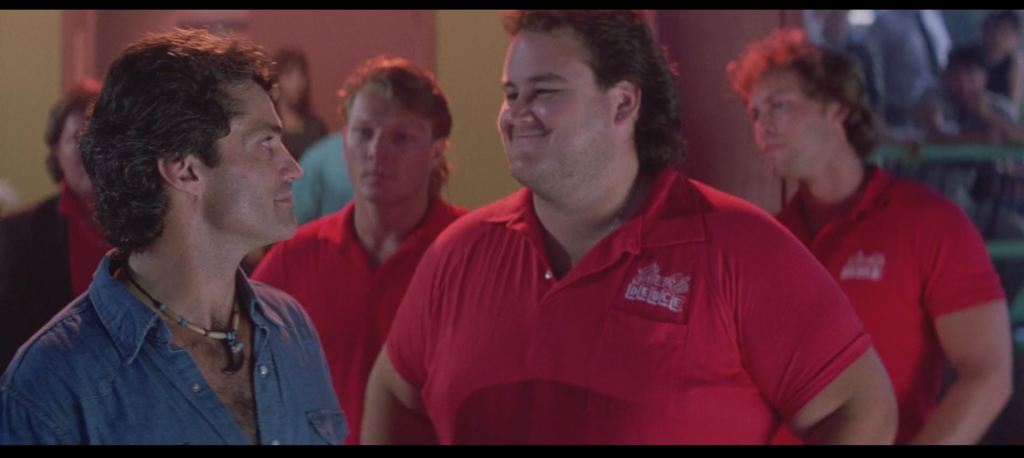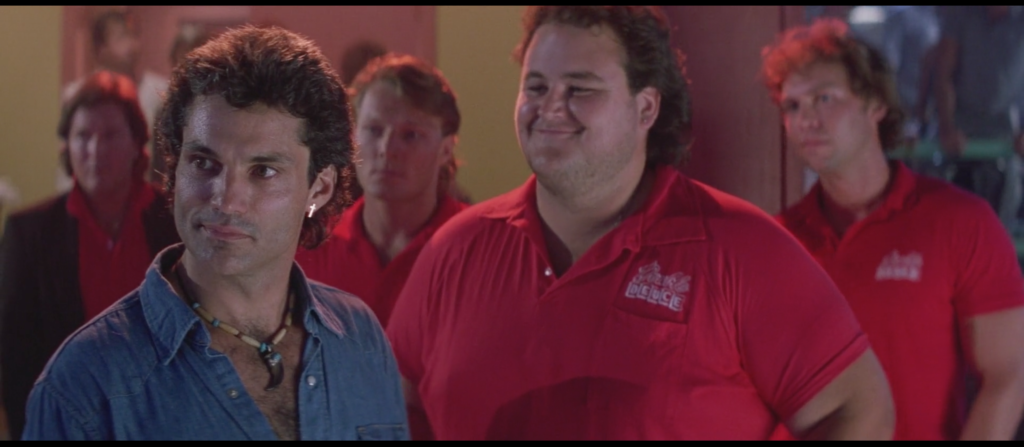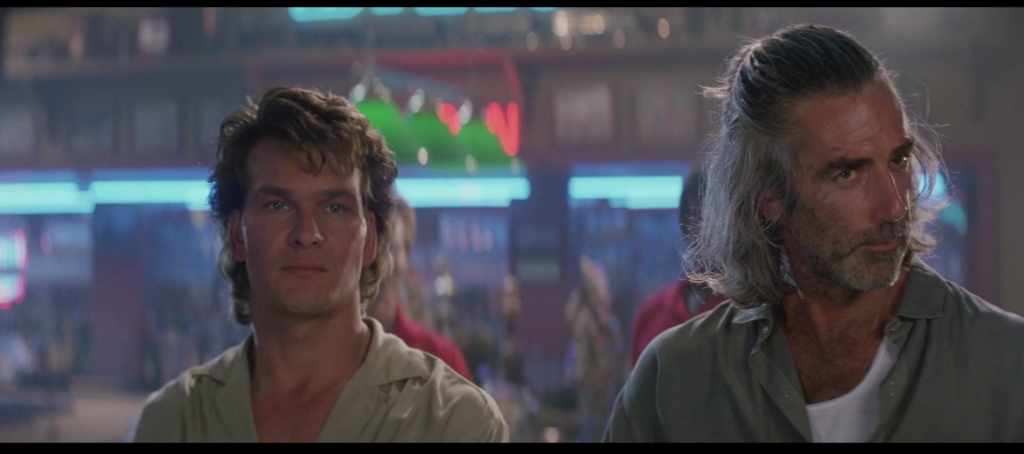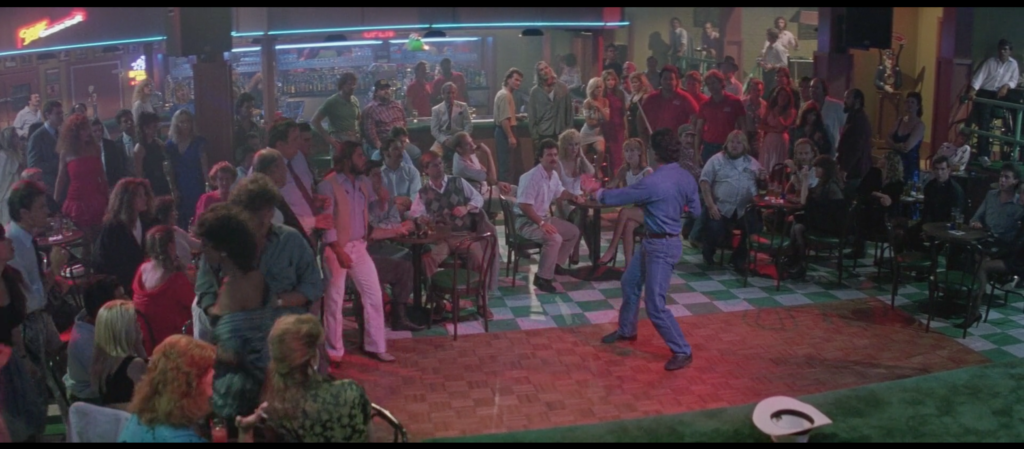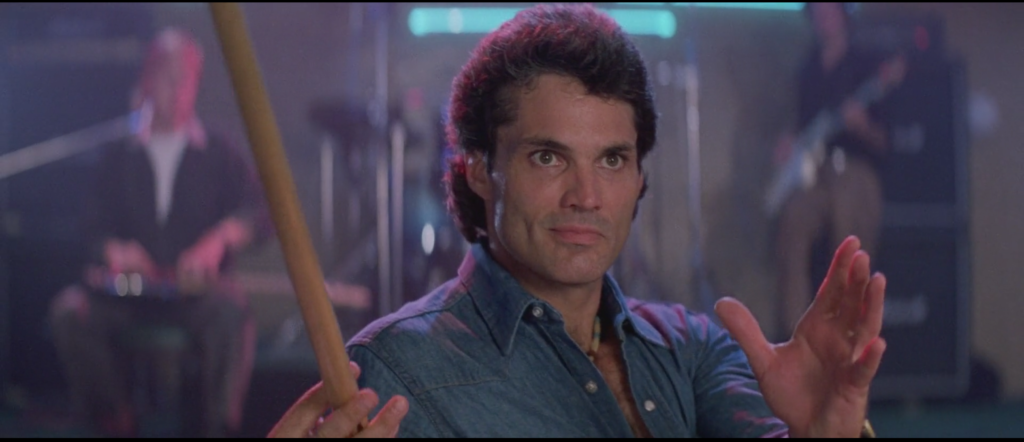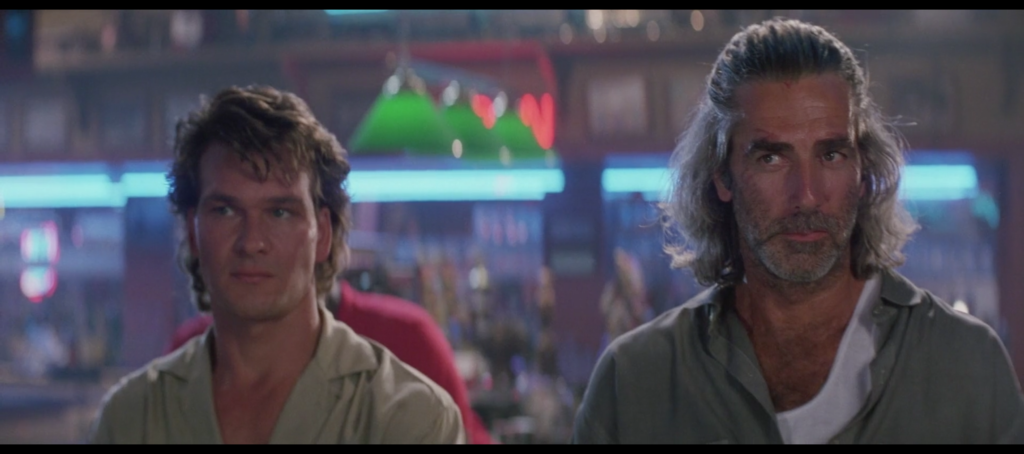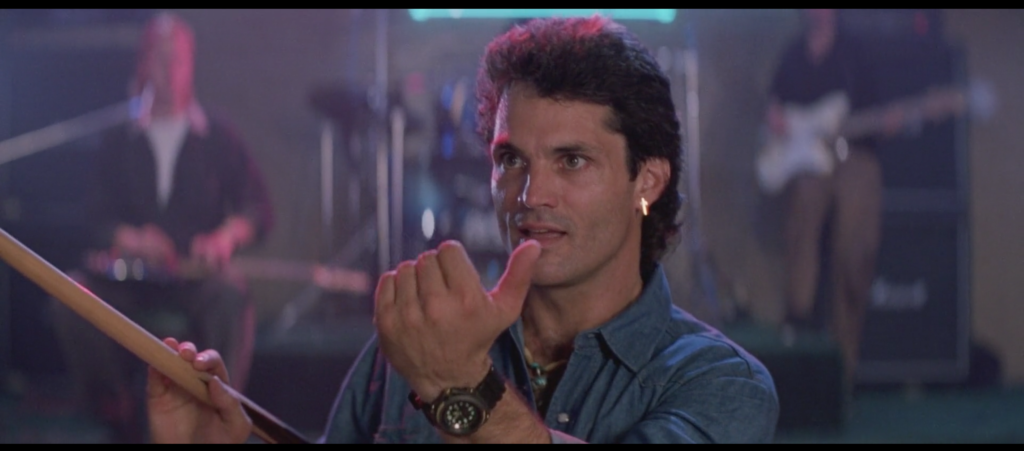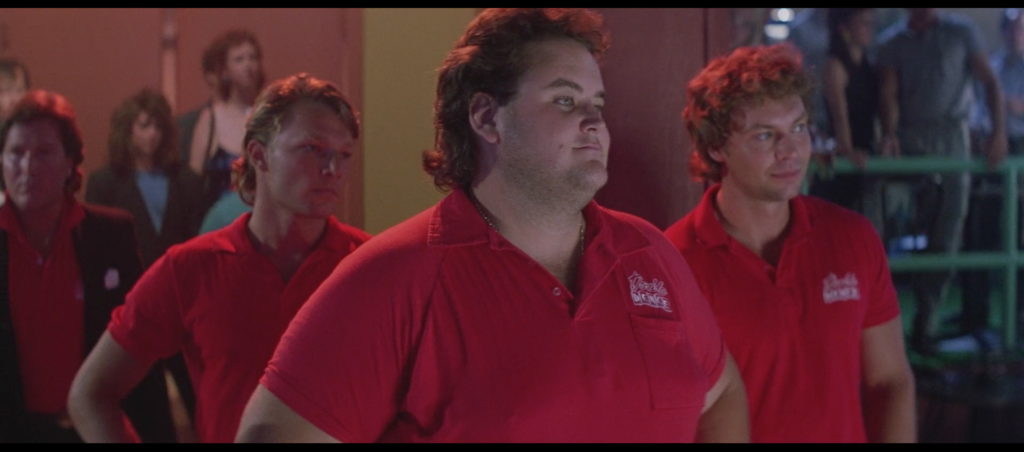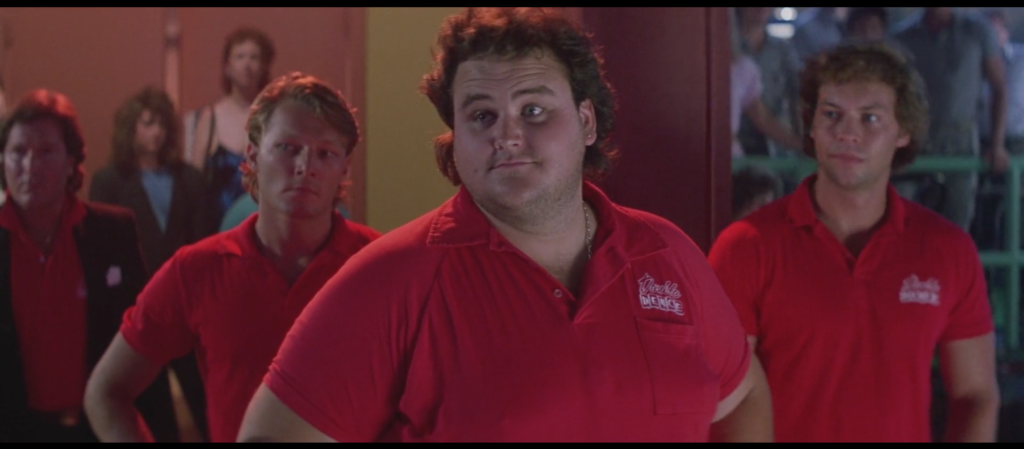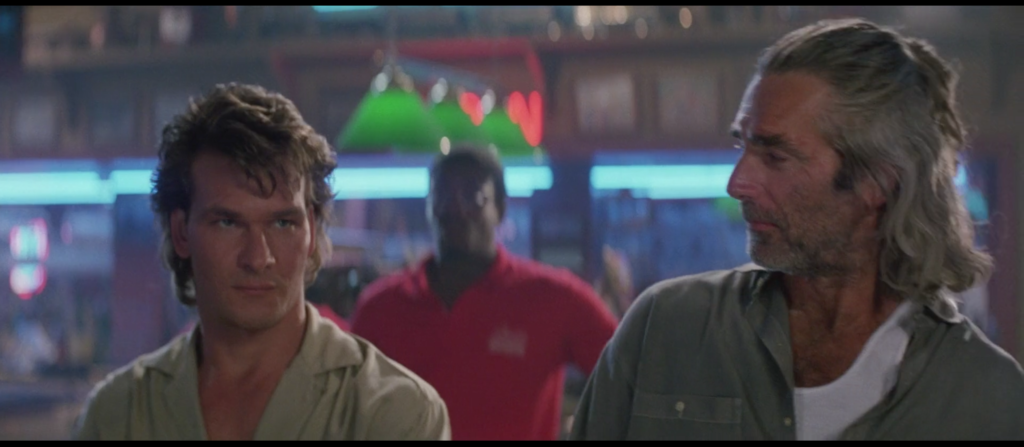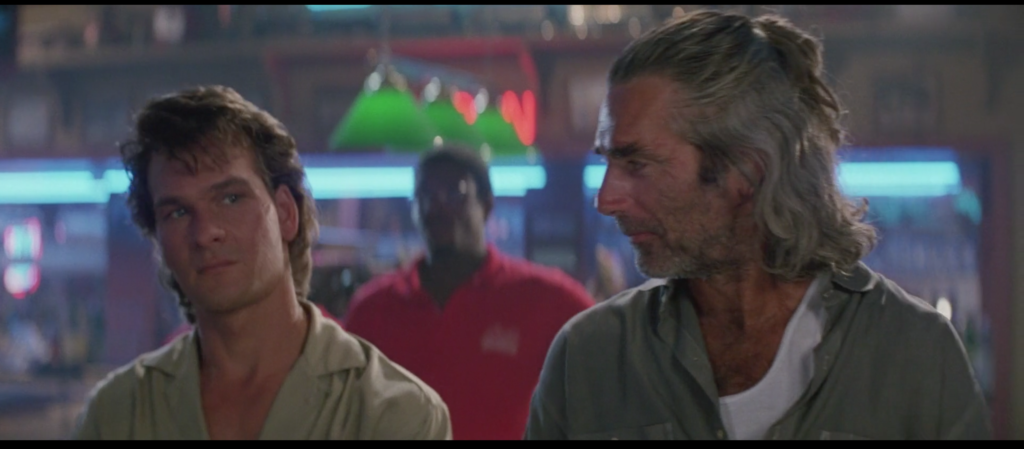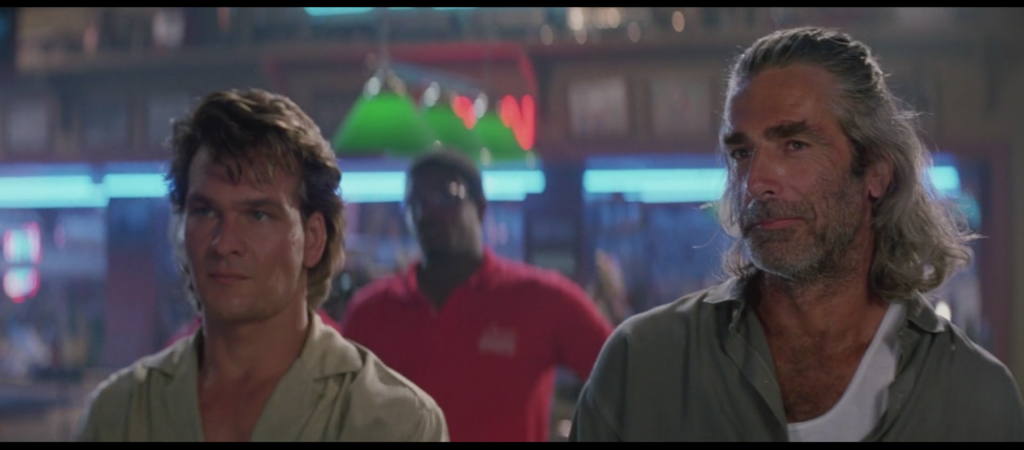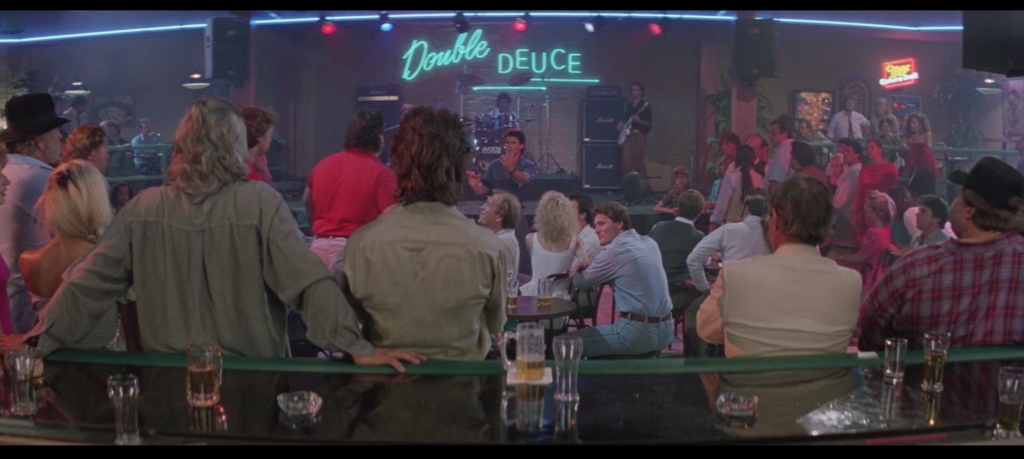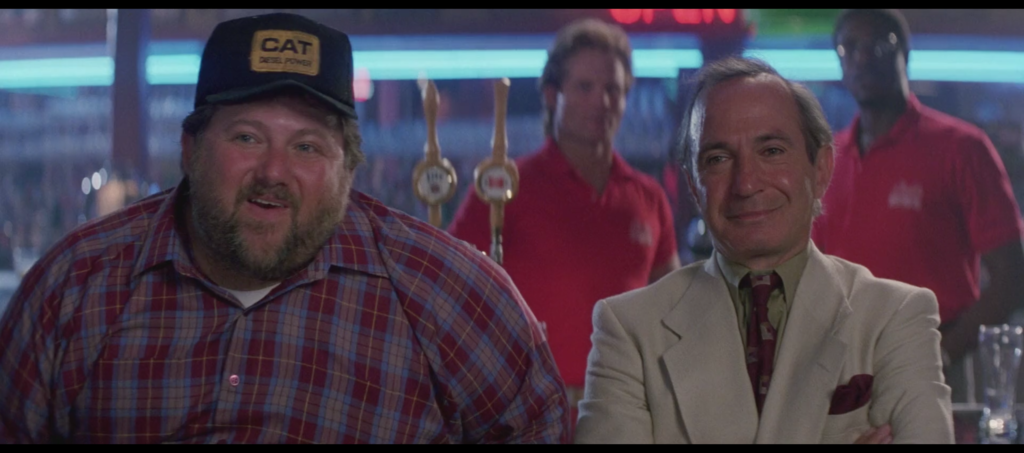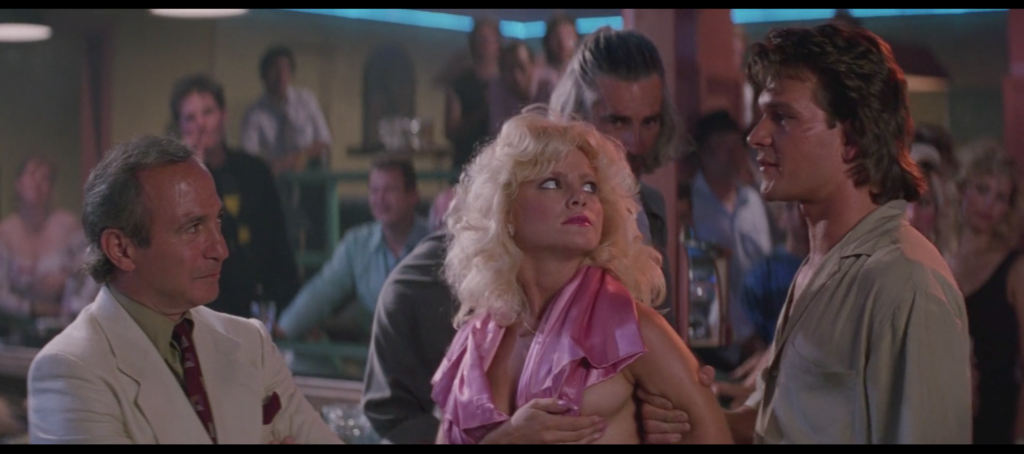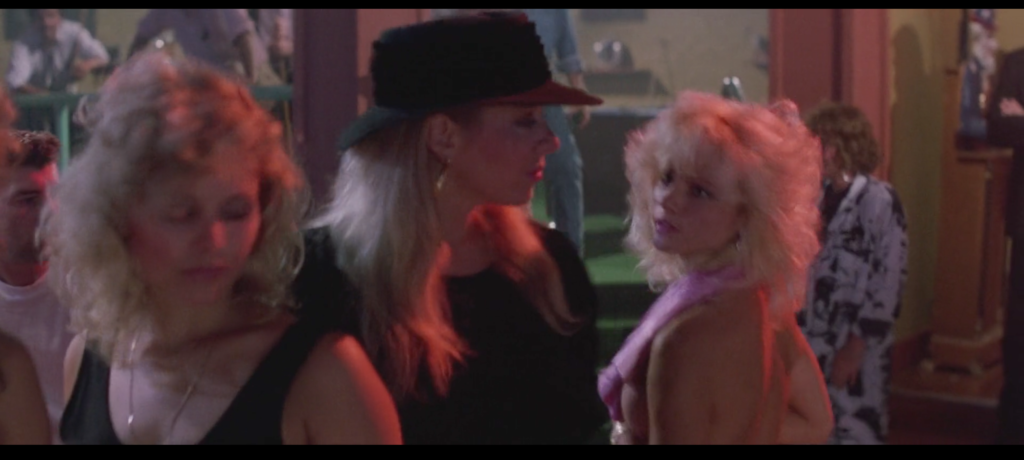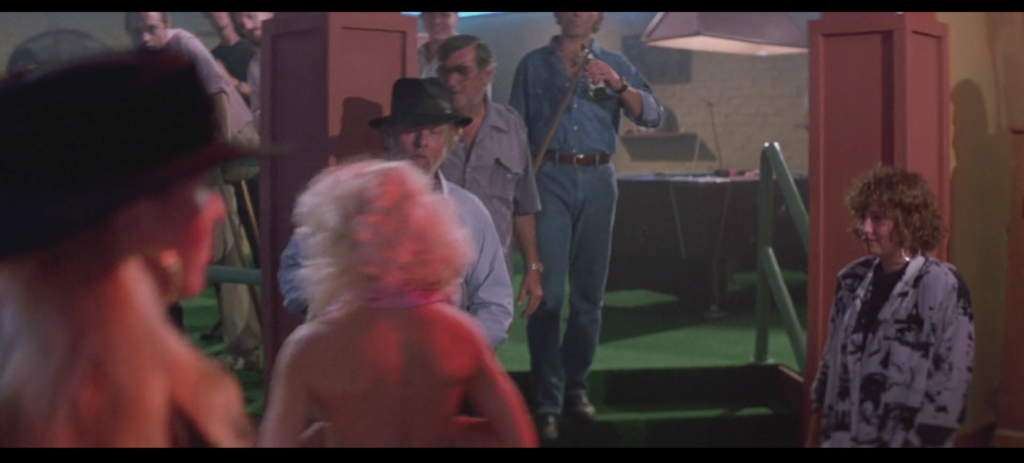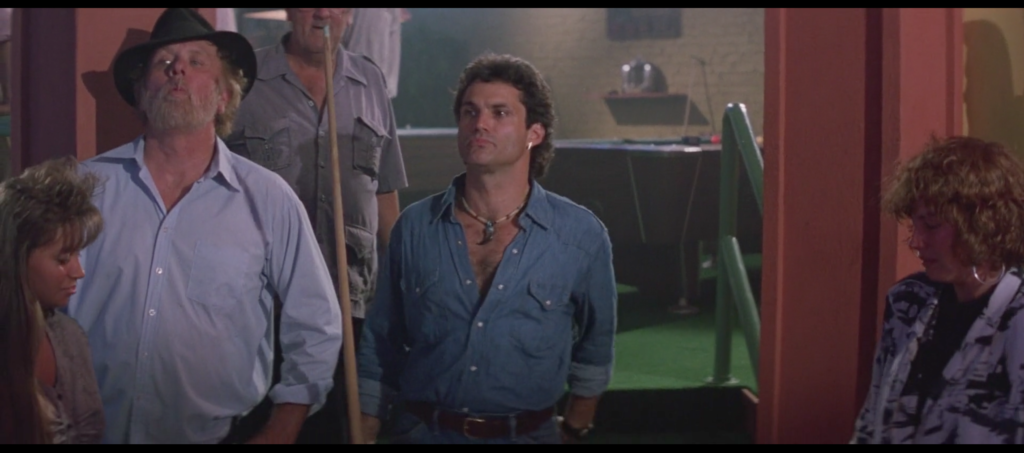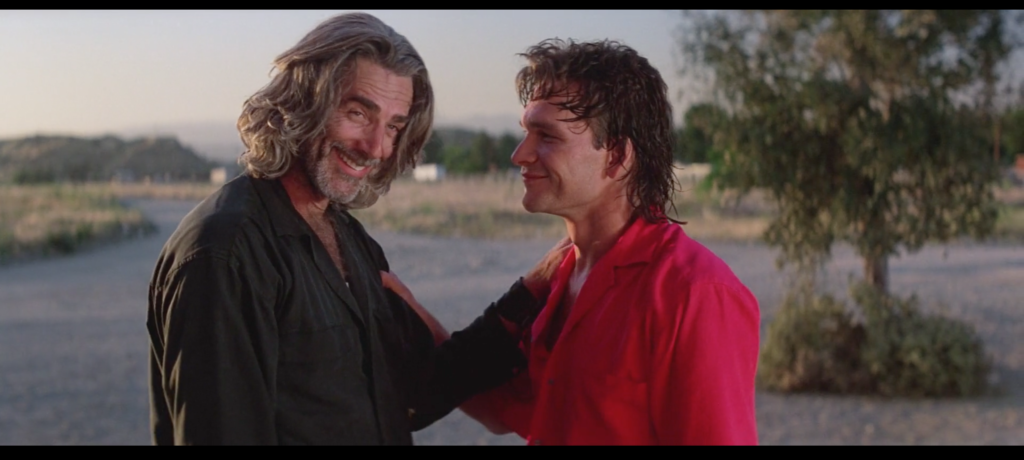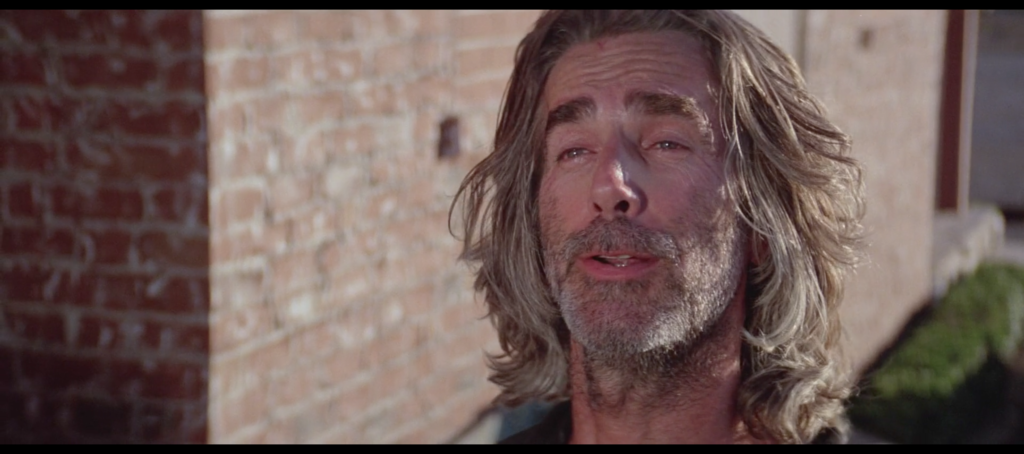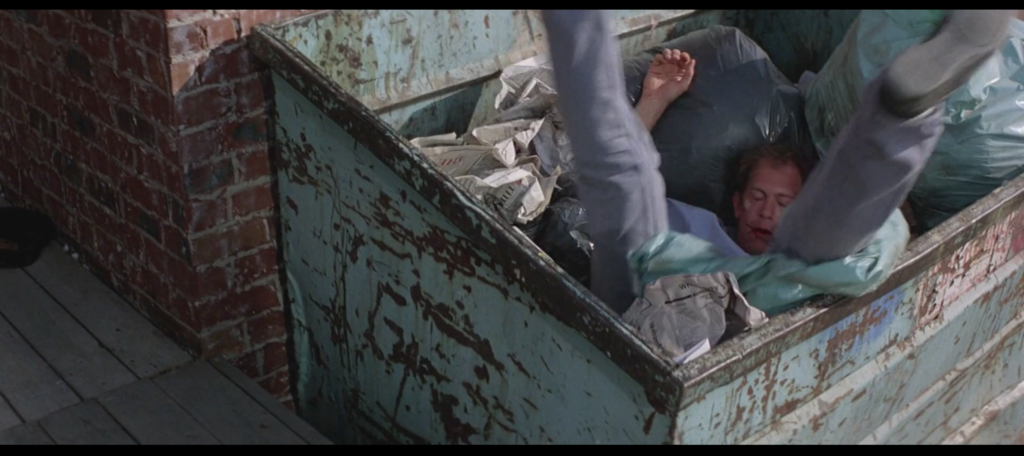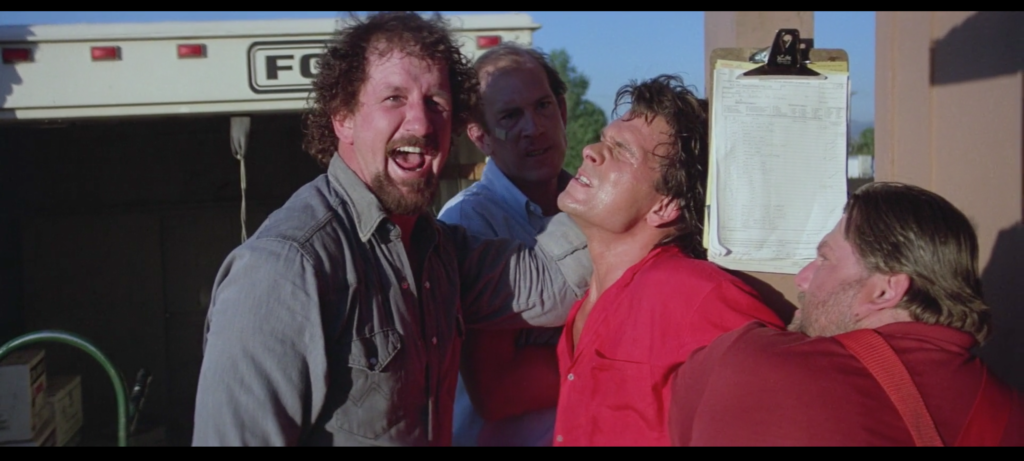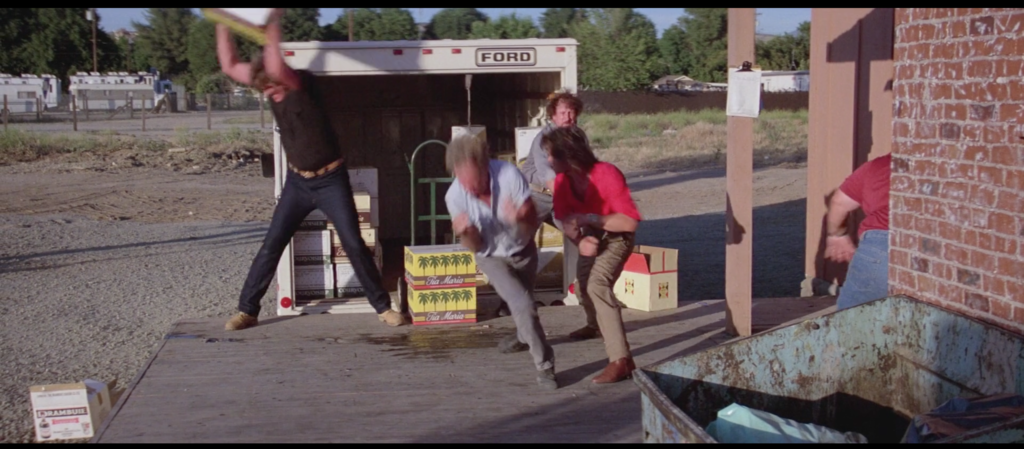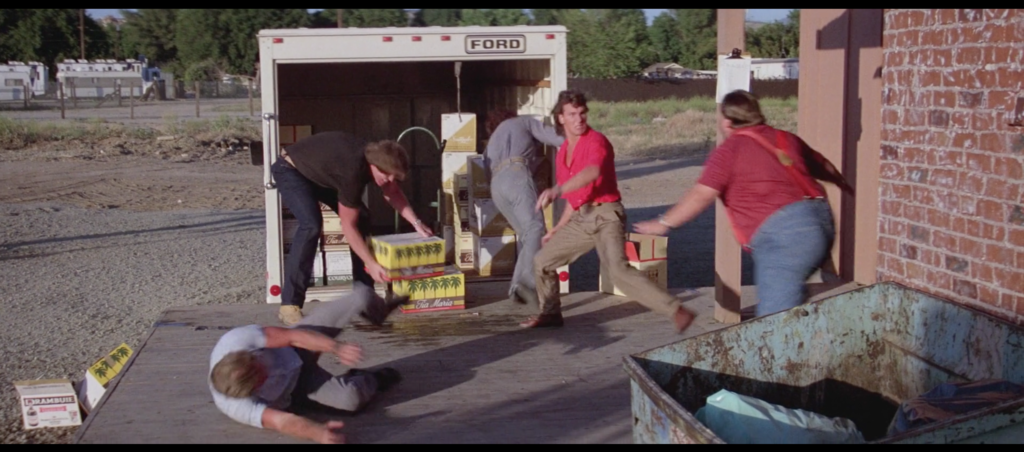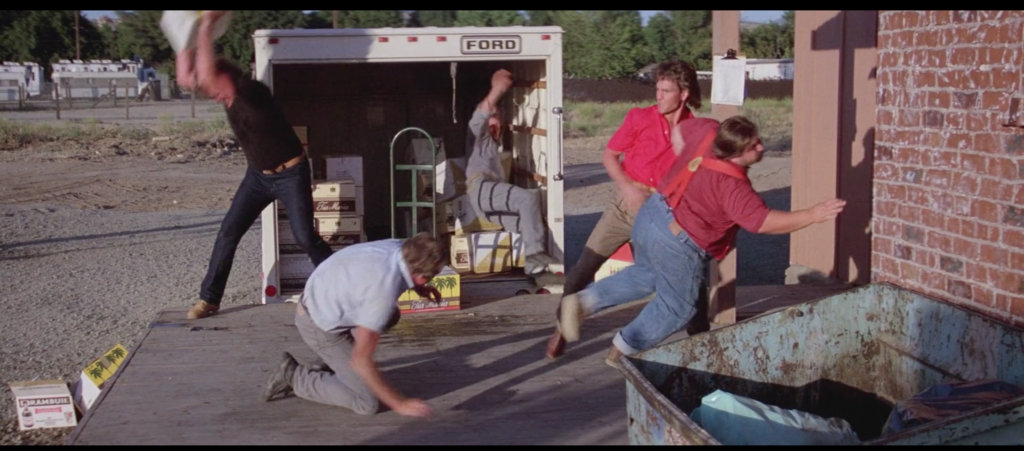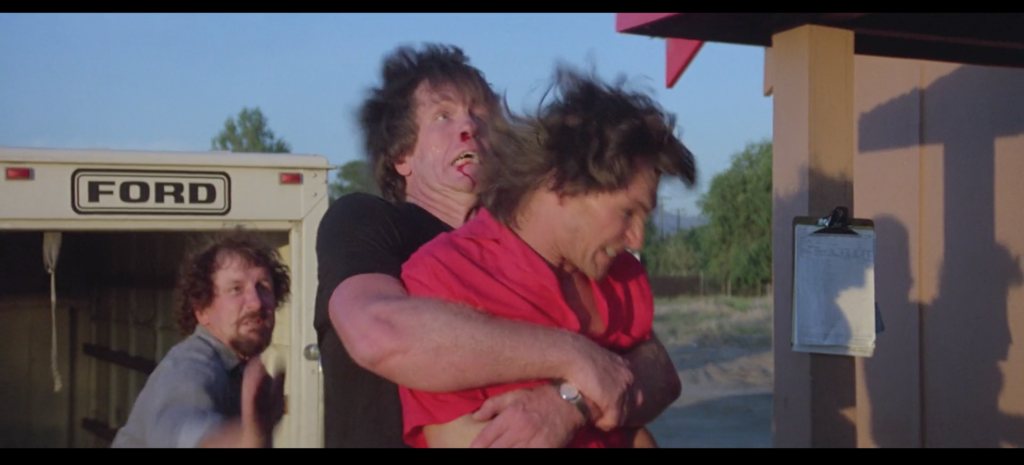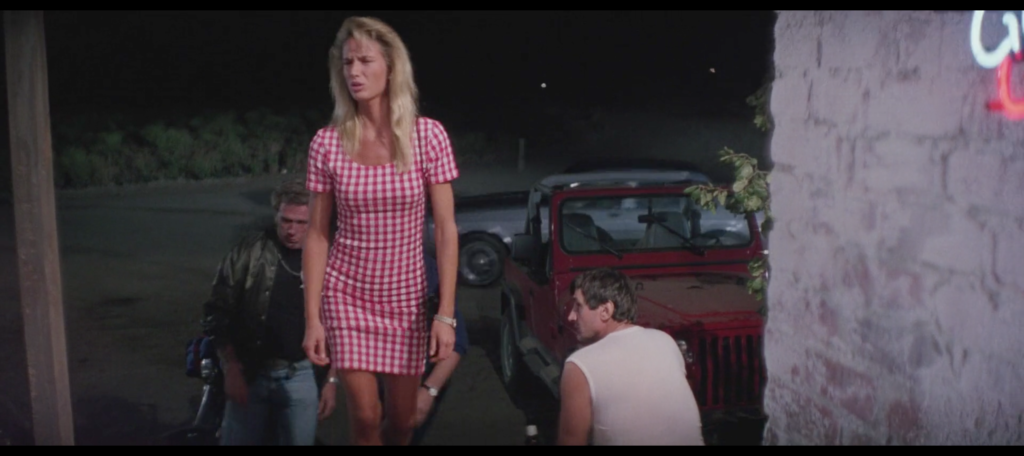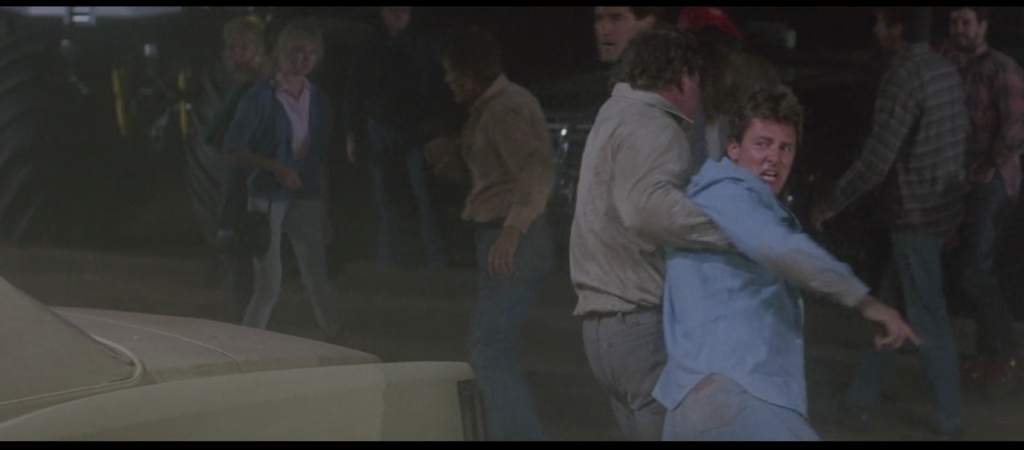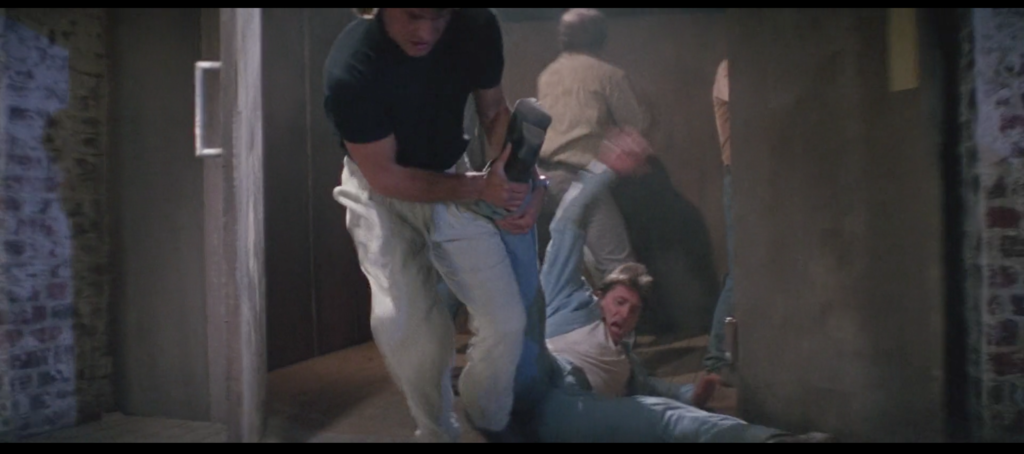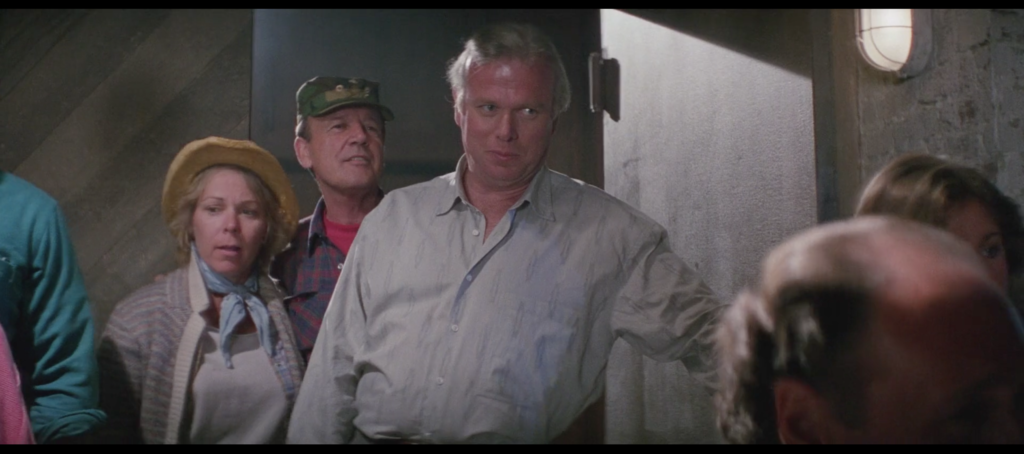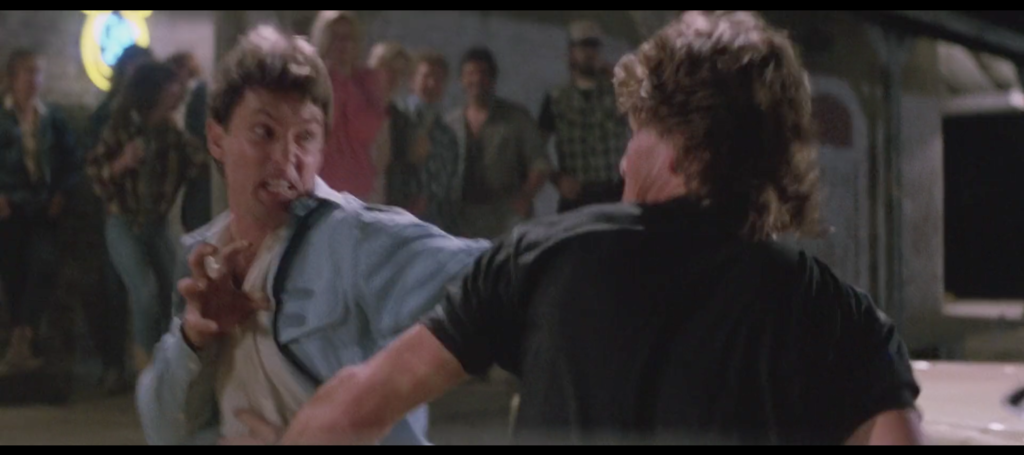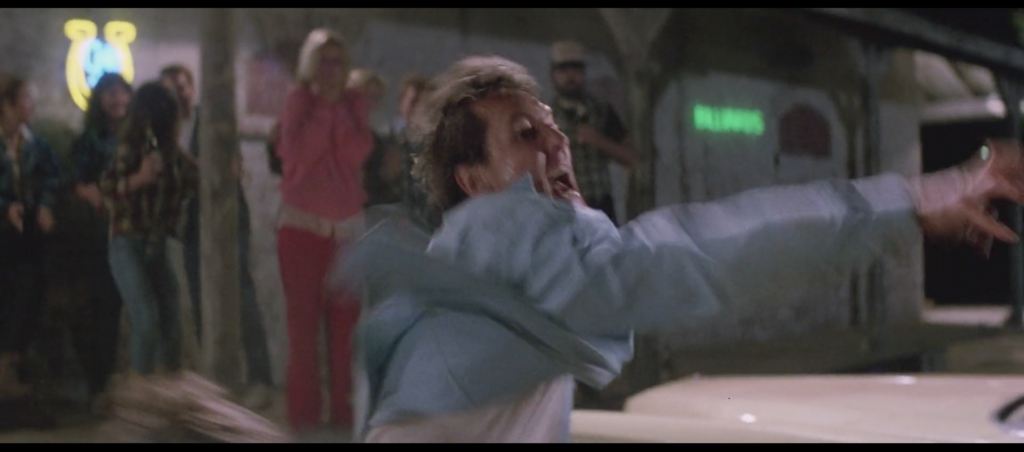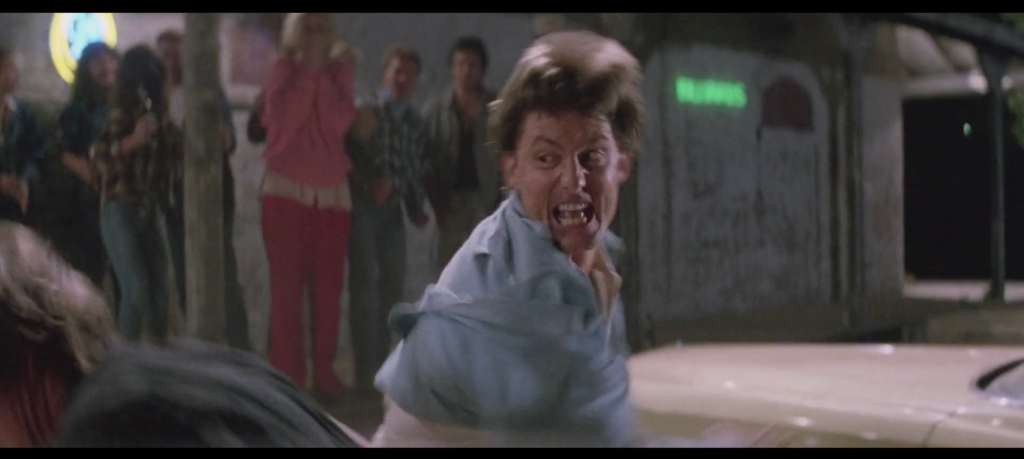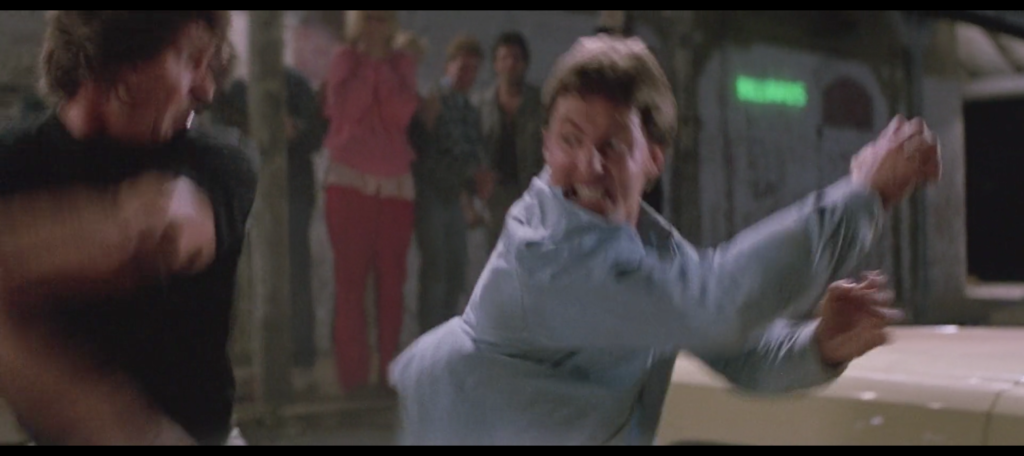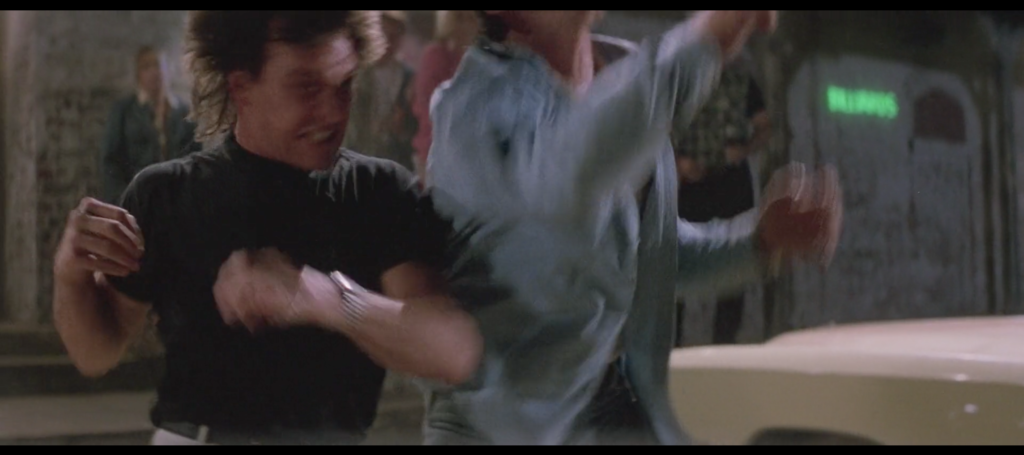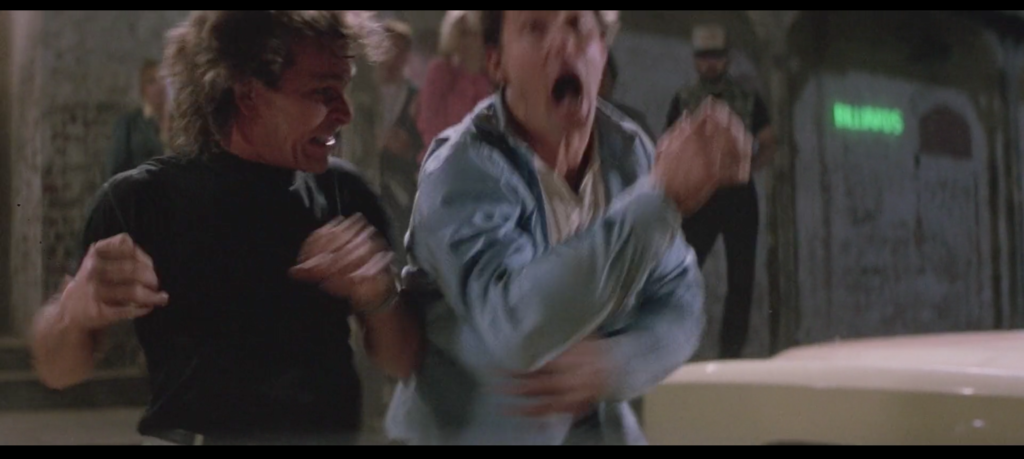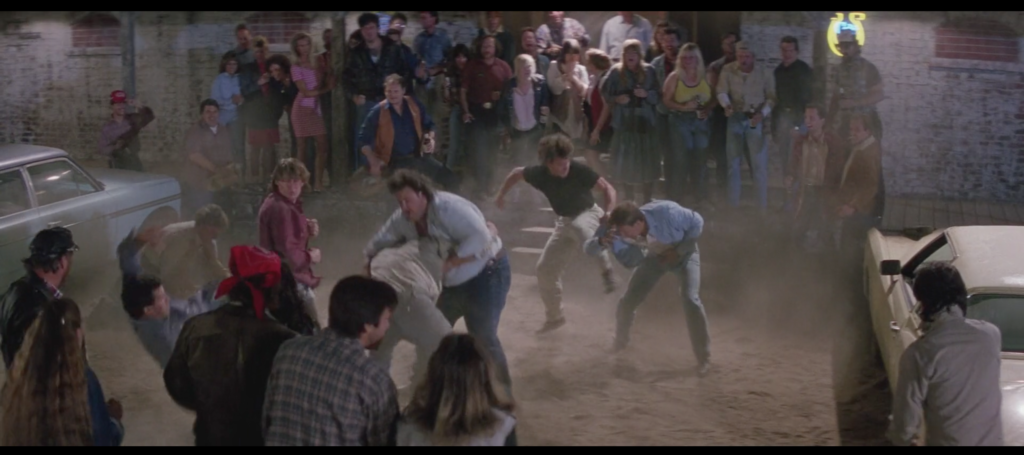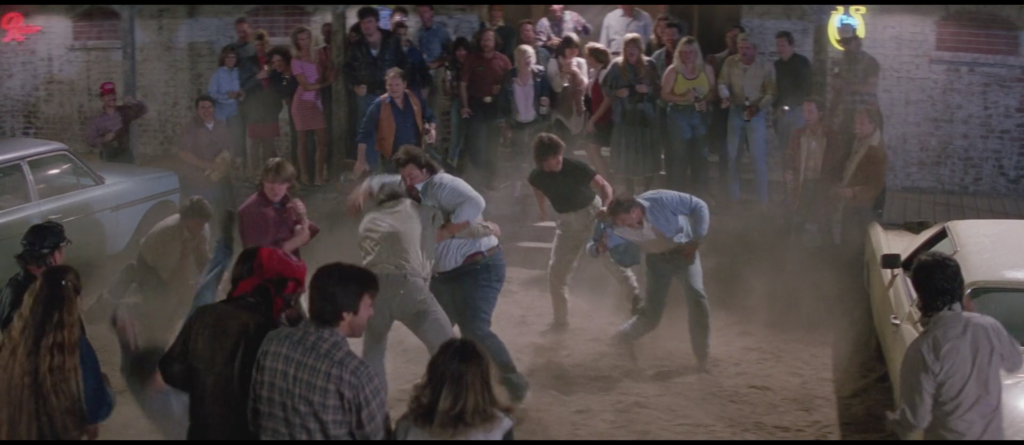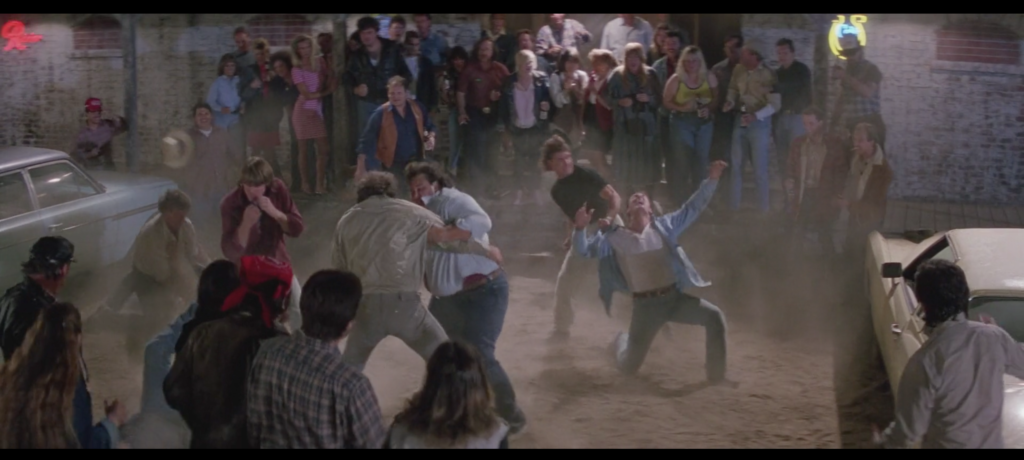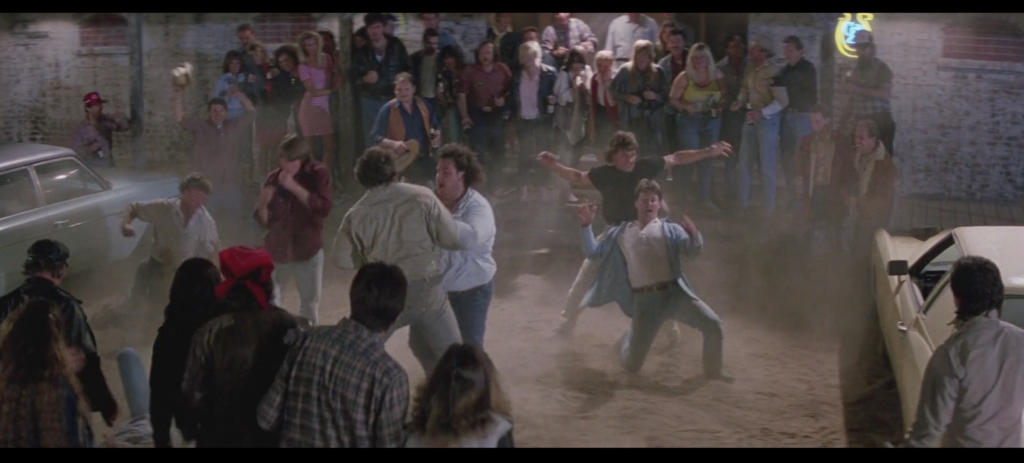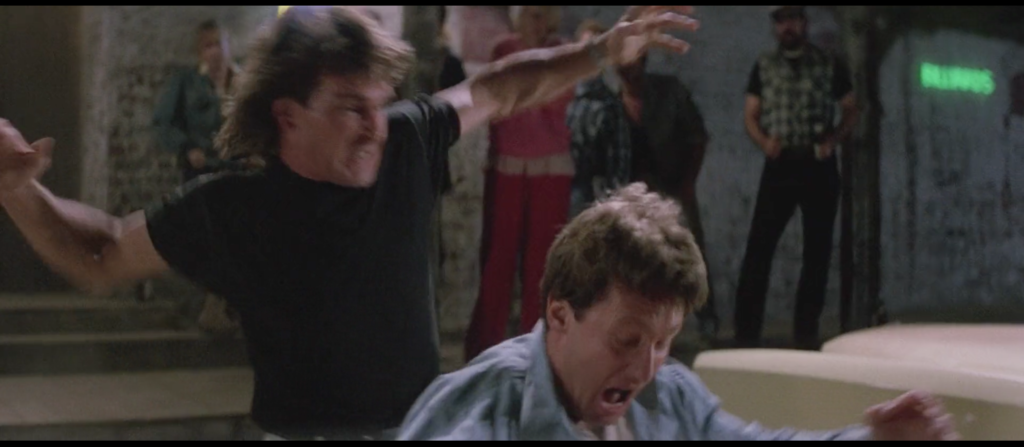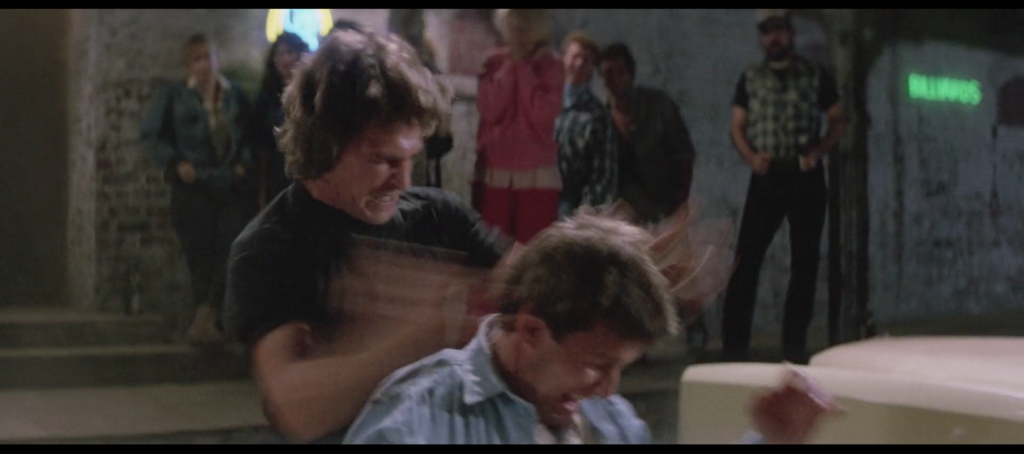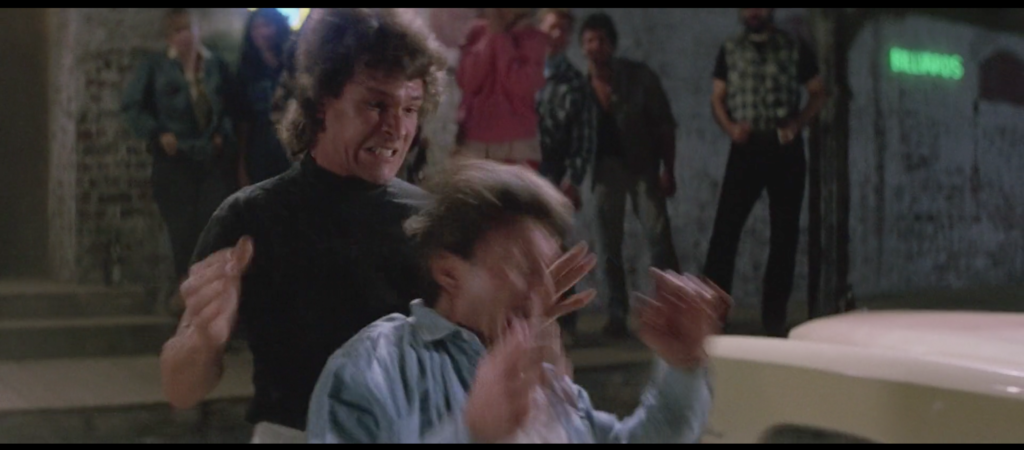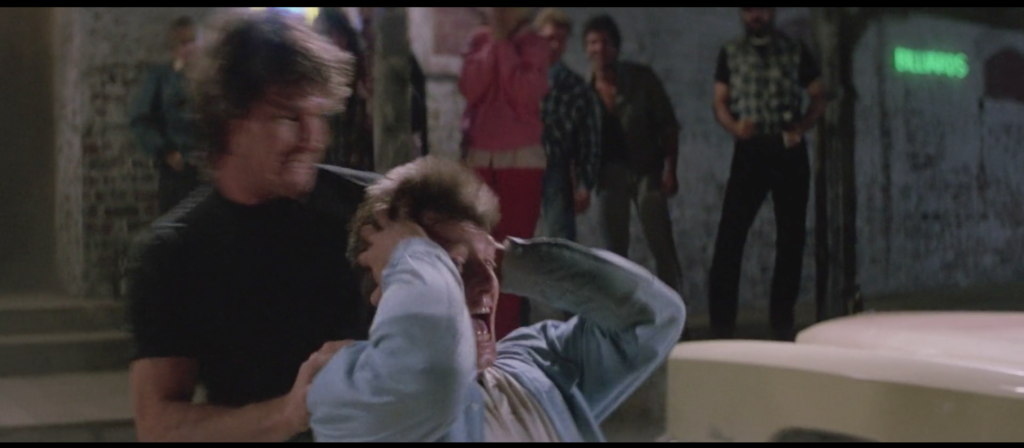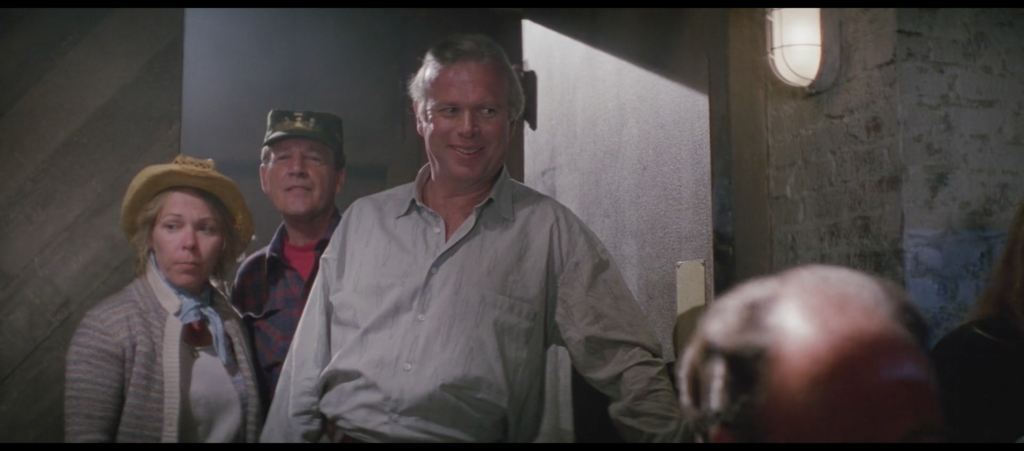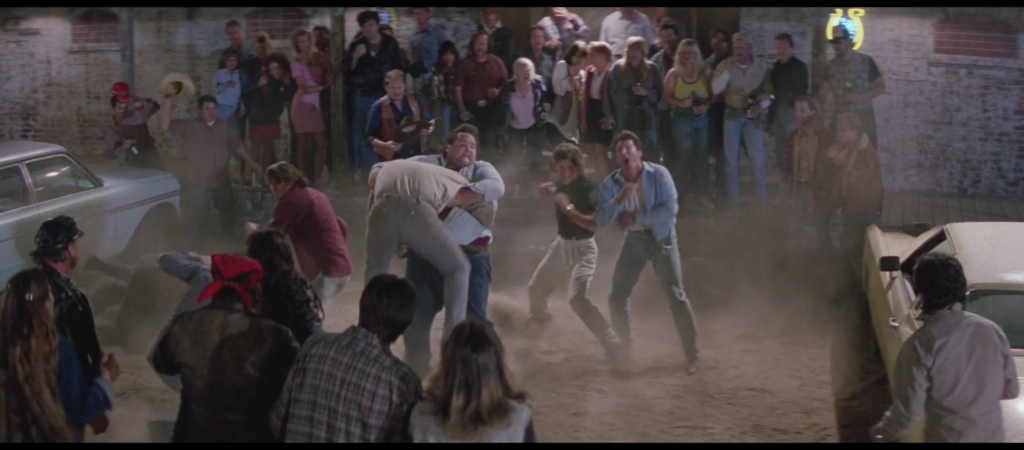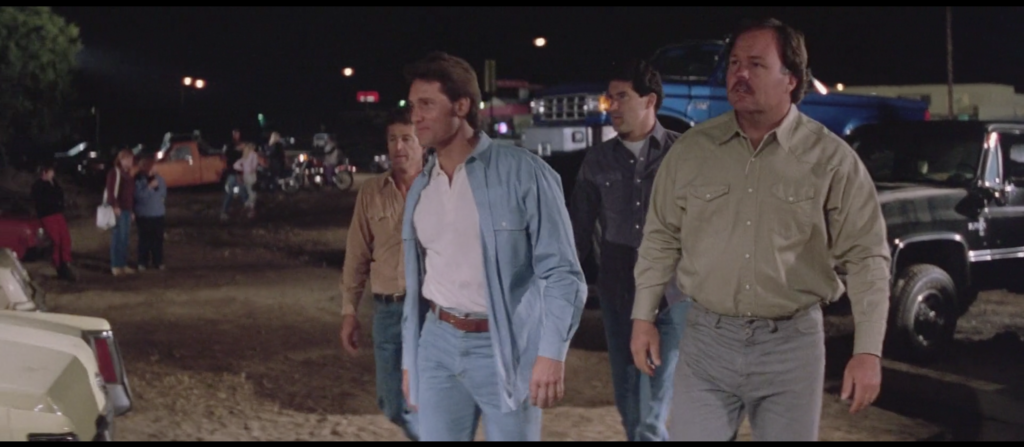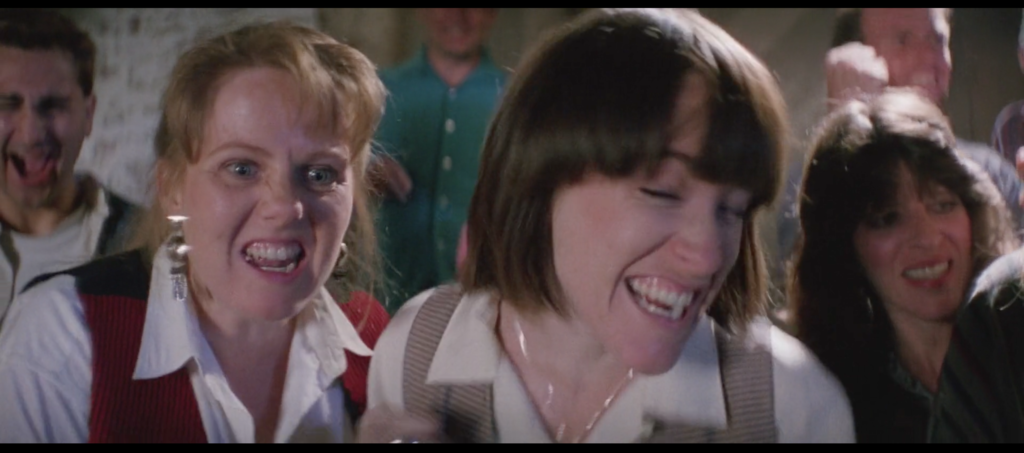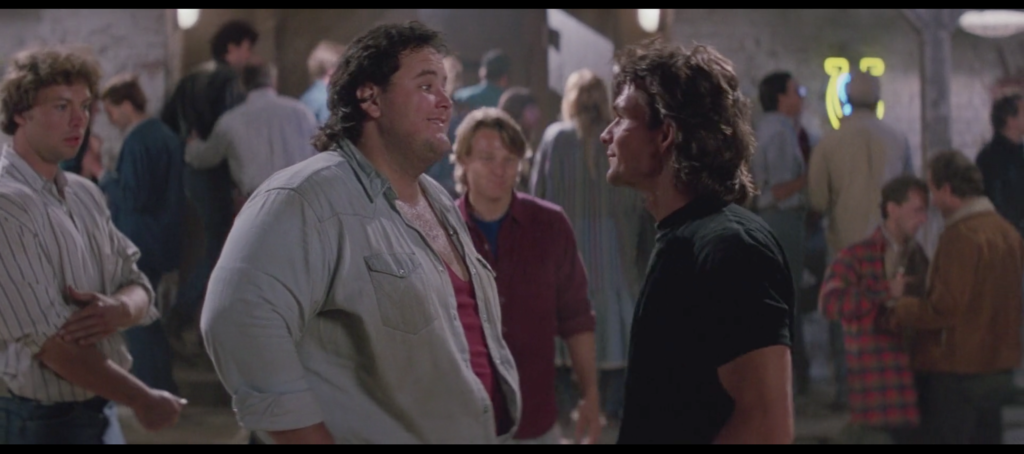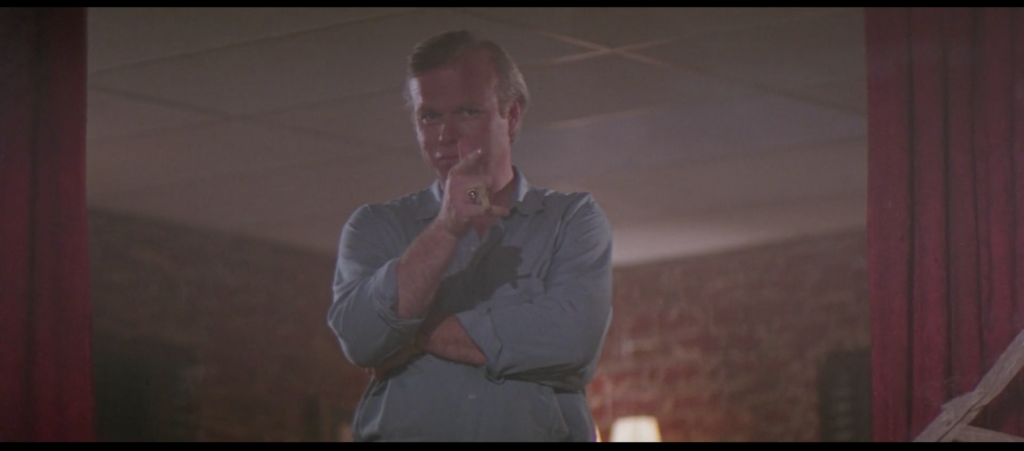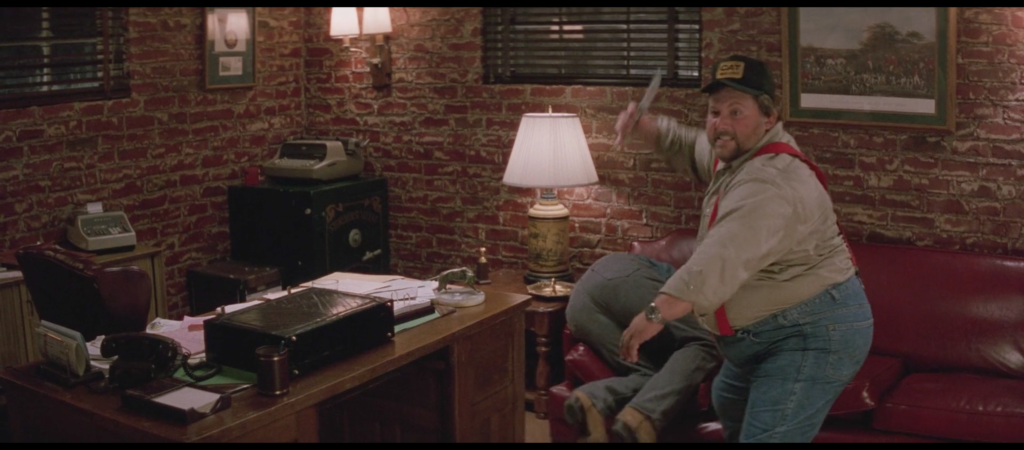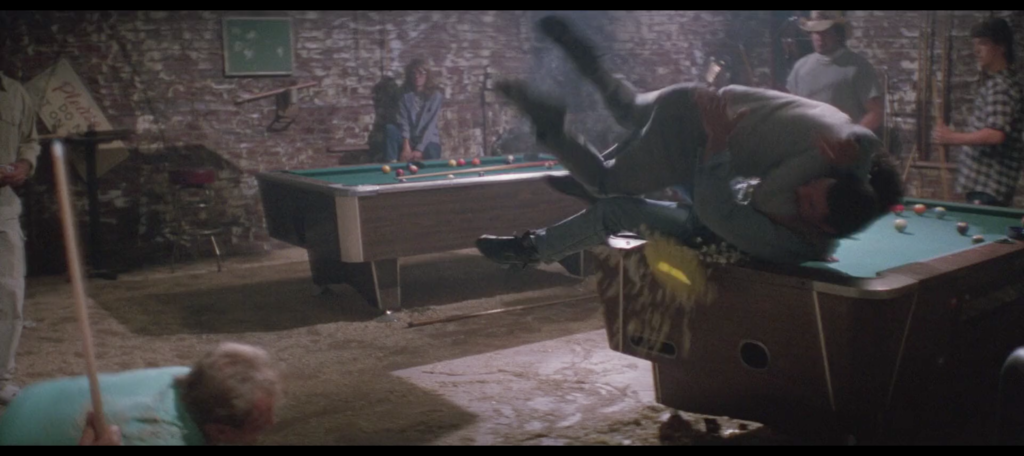Posts Tagged ‘fight scenes’
255. Faces
September 12, 2019254. “If you’re gonna have a pet, keep it on a leash”
September 11, 2019If you’ve read all 253 Pain Don’t Hurt entries to date you’ll agree I’m no fan of Dalton’s response to Denise’s striptease. His condescension, if not outright cruelty, to a sex worker and abuse survivor is unconscionable given his philosophical mandate to be nice until it’s time to not be nice. Is this, is the removal of Denise from the stage and the presentation of Denise to her abuser, really such a time?
All I can say in Dalton’s defense is that this is a rare case of seeing the forest but neglecting the trees. The destruction of Red Webster’s Auto Parts marks a major escalation of hostilities in the war between Dalton and Brad Wesley. That would make this time to not be nice, barring any further considerations; Dalton fails to realize that Denise and her plight are such further considerations. Moreover, the aforementioned war has been waged entirely, on Wesley’s side, by third parties, namely his goons. Dalton correctly locates Denise’s dance in the context of Wesleyan aggression, however weird that aggression might be in this case; he treats her as he might treat a goon, albeit one against which he does not want to raise his hand, missing the obvious distinctions between Denise and the Tinkers and O’Connors of the world.
It should be noted here that at one point Dalton cracks a wry smile at Denise when she’s beaming at him from the stage, but while that smile might be seen to indicate warmth towards her, it’s not at all dissimilar from the grins he occasionally flashes at the likes of Ketcham or Pat McGurn when they start to get up in his business. To Dalton, a goon is a goon is a goon.
But if he is guilty of making this categorical error, he is by no means alone. “If you’re gonna have a pet,” he tells Wesley while gripping Denise roughly by the arm, “keep it on a leash.”
Denise yanks her arm away.
“You’re right,” Wesley says, conceding the point.
Then—as if summoning a pet—he calls this man’s name.
228. “Gentlemen, Wade Garrett”
August 16, 2019The staff of the Double Deuce react to the Coming of Wade in a variety of ways. Tilghman leers, of course. The Nameless Bartender’s eyes get a little wide, his mouth goes a little slack. Jack, baffled, asks “Who is this guy?” Hank mutters an awestruck “Holy shit.” “Exactly right,” Wade replies, as if his name were in fact Holy Shit.
In the middle of it all there’s Cody, who whether by the rasp of his voice or the scent of his musk recognizes who the mysterious stranger is and fills in Jack and the assembled gawkers accordingly. “Gentlemen,” he says, “Wade Garrett.” This is a callback to the moment he told the patrons of the Double Deuce that “The name…is Dalton,” obviously; It is Cody’s fate to be the standard bearer for the coolers of the world, the voice announcing their presence.
But does he have to be such a damn sexist about it? He was led out the back door to the scene of the fight by Carrie Ann. When he tells everyone it’s Wade, Stella literally has her hand on his shoulder. “Gentlemen” is what they get in response? “Ladies and gentlemen” and people of every gender identity deserve to know they are in the presence of Wade Garrett when this is in fact so. If Cody has the time to spill the tea on Doc and Brad Wesley, he can throw in a few extra syllables for the sake of inclusivity. They deserve it. Wade deserves it.
227. “I sure ain’t gonna show you my dick.”
August 15, 2019MOUNTAIN: Are you gonna fight, dickless?
WADE GARRETT: I sure ain’t gonna show you my dick.
MIKE NELSON, RIFFTRAX: I don’t think that was even on the table! I…It wasn’t one of the options!
This brief exchange between Mountain (Tiny Ron) and Wade Garrett (Sam Elliott), and the response to it by Michael J. Nelson (Mystery Science Theater 3000), can’t be improved upon. In two lines you have all the hallmarks of Road House‘s bad-good writing style: hostility so severe it reads as a non sequitur, pointlessly escalated profanity, disconnected logic, attempted aphorisms that have never before or since been uttered by human beings. This exchange is Road House.
But to boil it down to dialogue is to miss what makes it even more Road House. Immediately after telling Mountain he is not going to show him his penis, Wade Garrett punches Mountain, you guessed it, right in the nuts. He then kicks him hard in his right knee, sending the giant tumbling to the ground with an oddly subdued “Oh, shit!””Goddamn, that hurts, dudn’t it?” Wade asks rhetorically, smirking while running his hand back over his hair. He’s not going to prove he isn’t dickless, but he’s sure as hell gonna make Mountain wish he was.
But wait, there’s more! Remember earlier in the film when Dalton told Jack “Gimme the biggest guy in the world: You smash his knee, he’ll drop like a stone?” QE motherfucking D.
So: needless profanity, needless hostility, gibberish idiom, illogic, dick joke, violence, cooler technique. Truly, this moment has it all.
226. “Take out the trash.”
August 14, 2019DALTON: I want you to be nice…until it’s time to not be nice.
YOUNGER: Well, how are we supposed to know when that is?
DALTON: You won’t. I’ll let you know. You are the bouncers. I am the cooler. All you have to do is watch my back—and each other’s…Take out the trash.
Submitted for your approval: O’Connor, beaten senseless by Wade Garrett, collapsing unconscious into a dumpster full of garbage. Essentially literally, Wade and Dalton watched each other’s backs and took out the trash. No more evidence of the efficacy of the Dalton Path’s Three Simple Rules need be presented. Everything is proceeding as he has foreseen.
225. “MIND YOUR OWN BUSINESS, DAD!”
August 13, 2019When Wade Garrett walks—actually it’s more of a mosey/saunter hybrid—through the back door of the Double Deuce, he’s greeted by quite a scene. On a concrete loading area surrounded by smashed cases of liquor, he finds two large men holding Dalton still so a third large man can pound his stomach like a punching bag with intestines inside, overseen by the largest (and at this point bloodiest) man of all. “How’s it goin’, mijo?” he asks with characteristic cool. Then Morgan, the fellow doing the punching, turns to him and absolutely snarls “MIND YOUR OWN BUSINESS, DAD!”
As my partner Julia Gfrörer once put it, “You know he’s been working up to that line for a few decades.”
That really is the only way to interpret the ferocious hostility with which Morgan imbues that paternal sobriquet, and the alacrity with which he selects it as the proper label for the older gentleman who’s just made his presence known to him. Hearing “Dad” used as an insult by a teenager is one thing, like “What are you, my dad?” when a friend objects to you trying to huff Pequa drain opener or something. From an adult, to another slightly but not really significantly older adult, it’s just…well, it raises certain questions, is what it does.
For the record, actor Terry Funk is actually a month older than actor Sam Elliott; they were both born in the summer of 1944, Terry on June 30, Sam on August 9. Perhaps, then, Dadness is merely a state of mind. A miscreant like Morgan would naturally chafe at the suggestion of supervision, as indeed he did when Dalton fired him. And a cooler like Wade Garrett, whatever his aversion to living a normal rule-bound life might be, sometimes needs must embrace his role as the enforcer, the stickler, the cooler head that must prevail. The kind of people who tell dads to mind their own business? They are his business. Morgan will soon learn this, to his dismay.
223. Quality Goonsmanship
August 11, 2019I kid, I kid the goons, and why not—they’re constantly getting their asses kicked. But look at our man Mountain here. Mountain knows that he and his comrades-in-arms have been sent to the Double Deuce with a very specific mission: Stop any and all liquor shipments. Mountain does not abandon this mission the moment Dalton throws hands. No, Mountain picks up a case of Tia Maria, throws it to the ground, turns, picks up a second case of Tia Maria, and throws it to the ground. Then and only then, after Dalton has rung the bells of Morgan and Tinker and O’Connor singlehandedly, does he turn his attention to Dalton.
Granted, once you’ve see what happens to him when he does attack Dalton—he lifts him clean off the ground in a bear hug, only to have his face bashed in by a pair of reverse headbutts—you’ll start wondering if maybe there wasn’t a third case of Tia Maria that wanted smashing. And if you pay close attention you’ll notice that by decking Morgan right into the back of the truck, toppling pretty much every remaining case of booze it contains, Dalton himself did more damage to the shipment than Mountain. But I’d consider that last bit a loss leader. Better to lose a few bottles in the process of leveling men who’d present a constant threat than to spare them but also spare the saboteurs. To flip that logic around, perhaps Mountain should have worried about the cooler first and the wine coolers second.
Be that as it may. Brad Wesley so rarely gets his money’s worth out of his “boys,” not that this dissuades him from sending the same clowns out to get got over and over again. This is Mountain’s one and only mission, and I think he acquits himself admirably, to a point. A good goon is hard to find, and he would have been a good goon, if it had been somebody there to beat the shit out of him and his buddies every minute of his life.
222. The Gentle Art of Being Nice
August 10, 2019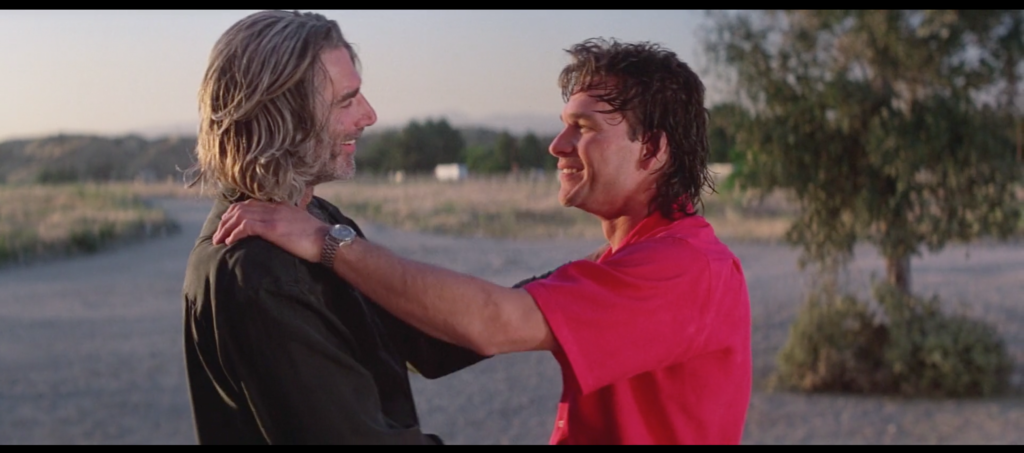 Look at this beautiful shot of Wade Garrett and Dalton, embracing after a long separation. The late afternoon light gleaming off Wade’s silver hair and hugging the sculpted contours of Dalton’s grinning face. Smiles as wide as the day is long. Each with one approving hand on the other’s shoulders, their other hands clasped in merry meeting.
Look at this beautiful shot of Wade Garrett and Dalton, embracing after a long separation. The late afternoon light gleaming off Wade’s silver hair and hugging the sculpted contours of Dalton’s grinning face. Smiles as wide as the day is long. Each with one approving hand on the other’s shoulders, their other hands clasped in merry meeting.
From the looks of them you’d never know they just beat four men unconscious.
But that is the Dalton Path, that is the Way of Wade Garrett, that is the tao of all coolers. The Time to Not Be Nice passed when their last enemy collapsed to the ground in a bloody heap. The Time to Be Nice has come, and they welcome this as readily and naturally as they responded to an attack with superior force of their own.
A crowd of Double Deuce employees has gathered at this point, to gaze in wide-eyed wonder on these two knights errant, these sworn swords, and on those they cut down. To walk the Dalton Path, a gray ribbon that runs to either horizon, the lines on the road alternating streaks of white and red.
220. Here Come the Goons Again
August 8, 2019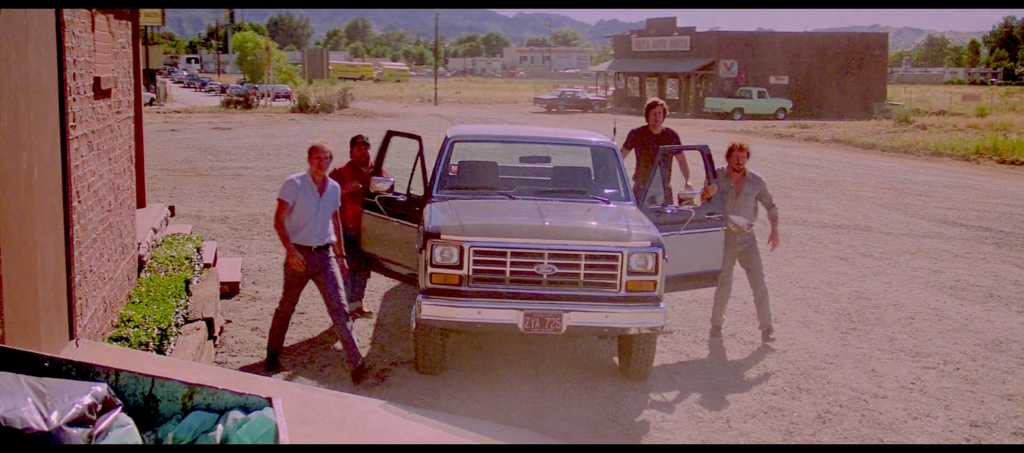
Here come the goons again
Pounding on my head like a memory
Pounding on my head like a new emotion
I want a shirt with an open chest
I want to talk like bleeders do
I want to dive clear of your boot knife
Do you bleed too much too?
O’Connor talk to me
Like bleeders do
Walk with me
Like bleeders do
Talk to me
Like bleeders do
Here come the goons again
Kick me in my head like a tragedy
Tearing out my throat like a new emotion
I want to bleed in the open wind
I want to kiss like coolers do
I want to dive clear of your knife boot
Do you bleed too much too?
O’Connor talk to me
Like bleeders do
Walk with me
Like bleeders do
Talk to me
Like bleeders do
Ooooooh
Ooooooh yeah
Here they come again
Ooooooh
Hey hey hey hey hey hey hey
Here come the goons again
Pounding on my head like a memory
Pounding on my head like a new emotion
(Here they again, here they comes again)
I want a shirt with an open chest
I want to talk like bleeders do
I want dive clear of your boot knife
Do you bleed too much too?
151. You simply hate to see it
May 31, 2019The Doc is no fan of barfights. Good heavens no! Not even the ones that take place in parking lots outside the bar and thus run less risk of concussions on tables and whatnot. I mean, look at her! Here she is, sauntering up to the Double Deuce in her finest gingham clubwear, absolutely shocked and appalled and a little bit disgusted and a tiny tad outraged to see that a bar so well known for its barfights that she cracks jokes about it to patients who’ve incurred injuries there is hosting a barfight. Treating the wounded is one thing, but watching the wounding is quite another, apparently! Anyway in about a minute she’ll make googly eyes at the winning combatant and tell him he’s what she’s looking for, so she gets over it. You could probably chalk up the disconnect to Rowdy Herrington directing Kelly Lynch like a showdog rather than a human actor, you can probably hear him say “You’re disgusted, you see it and you can’t believe it, you’re wincing it’s so painful even to look at” and her thinking well it’s a living and giving him that ooooh face with all she’s got. But that is the coward’s way. Here at Pain Don’t Hurt we attribute agency to accident and thus we can interpret this as Dr. Elizabeth Clay blanching at the sight of the source of her income stream. Given that she was once married to Brad Wesley it’s not a half-bad interpretation, when you get right down to it. Dr. Elizabeth Clay is a student in the art of ignoring the obvious until it’s too late to look away.
147. Look Back in Anger
May 27, 2019In addition to “embedding a knife in a boot” and “murdering Wade Garrett” and “being Mister Clean Jeans,” Ketchum has a leg up (wink!) on his fellow goons in one other respect: He is outraged that Dalton has the temerity to whip his ass. “Son of a bitch!” he shouts at the cooler as Captain Turner pulls him away, one boot on, one boot somewhere above the streets of Jasper. It’s the same verbiage employed by Carrie Ann when she brains some drunken dipstick with a beer bottle in the middle of that full-scale riot within the bar earlier in the film. She’s just a working woman trying to make a living and not get groped or punched or forced to bear witness to other people enduring the same. Ketchum is a paid killer who just attempted to murder a man by kicking him in the skull with a knife-shoe. That man intercepted the killing Rockette maneuver and simply followed the Three Simple Rules in response. But does this keep Ketchum from acting like he’s the wronged party once things don’t go the way he wants them to? Heavens no. Not one for simply going quietly and licking his wounds is Ketchum. One last “how dare you sir,” in modern vernacular of course, is required before he drifts away, allowing Dalton to go on a date with Dr. Elizabeth Clay that will change the lives of all three of them. (Death changes your life.) In Ketchum’s climactic whinge you hear the sound of privilege. Like his boss Brad Wesley, who expresses surprise that anyone would resist him more than once as the film continues, Ketchum does not believe those he oppresses have the right to fight back. But it’s more than that: He does not believe that those he oppresses should even be able to formulate the knowledge, desire, and will the very notion of “fighting back” requires. They should be as blissfully unaware of their power in this situation as an animal that has briefly slipped loose of its bonds and, should it realize its chance for freedom is upon it, could reduce its human handler to red wreckage. But they don’t realize. Neither, according to the only form of morality the Wesleys and Ketchums acknowledge, should the hoi polloi of Jasper.
J.R.R. Tolkien once said “I think that many confuse ‘applicability’ with ‘allegory’; but the one resides within the freedom of the reader, and the other in the purposed dominion of the author” and I think about that a lot.
144. The thousand injuries of Fortunato I had borne as I best could, but when he ventured upon insult I vowed revenge.
May 24, 2019Here’s Ketchum, the clear second to Jimmy in the hierarchy of Brad Wesley’s goons and his successor upon his death in much the same way that the unspecified entity Gothmog assumed control of the assault on Minas Tirith following the death of the Witch-king of Angmar, getting dragged out of the Double Deuce on his ass into the dirt parking lot outside. Bumpty bumpty bump, right down the front steps, squealing and mewling over his injured ankle all the way. In a matter of seconds, Dalton thwarted his assassination attempt, caught his leg in midair, ruthlessly twisted it, yelled “You’re too stupid to have a good time!” right in his face, toppled him to the ground, and dragged his ass, literally, into the dirt, also literally. Such is the indignity of this forced exit that, get this, his extended free leg is actually what opens the right-hand door (facing the building) while Dalton shoulders open the left. He is forced to facilitate his own humiliating defeat.
Now in addition to being the most anonymous of Wesley’s core goons, Ketchum is also the least sympathetic. My guess is that the two phenomena are interrelated. Can’t feel sympathy for a guy you can’t remember!
But recall that in the world of the story, Ketchum is a thought leader, a ring general , a man to whom the Tinkers and Bleeders and sister-sons of the world are supposed to look for guidance. Both Tinker and O’Connor—Tinker! and O’Connor!—fare better in their fight against Dalton than Ketchum does in his. Dalton beats Ketchum like a mule. To keep up the ring-general jargon, bahgawd ref, stop the damn match.
Later in the film, Ketchum murders Wade Garrett.
“They’re not my brothers,” Jon snapped. “They hate me because I’m better than they are.”
“No. They hate you because you act like you’re better than they are. They look at you and see a castle-bred bastard who thinks he’s a lordling.” The armorer leaned close. “You’re no lordling. Remember that. You’re a Snow, not a Stark. You’re a bastard and a bully.”
“A bully?” Jon almost choked on the word. The accusation was so unjust it took his breath away. “They were the ones who came after me. Four of them.”
“Four that you’ve humiliated in the yard. Four who are probably afraid of you. I’ve watched you fight. It’s not training with you. Put a good edge on your sword, and they’d be dead meat; you know it, I know it, they know it. You leave them nothing. You shame them. Does that make you proud?”
Jon hesitated. He did feel proud when he won. Why shouldn’t he? But the armorer was taking that away too, making it sound as if he were doing something wrong. “They’re all older than me,” he said defensively.
“Older and bigger and stronger, that’s the truth. I’ll wager your master-at-arms taught you how to fight bigger men at Winterfell, though. Who was he, some old knight?”
“Ser Rodrik Cassel,” Jon said warily. There was a trap here. He felt it closing around him.
Donal Noye leaned forward, into Jon’s face. “Now think on this, boy. None of these others have ever had a master-at-arms until Ser Alliser. Their fathers were farmers and wagonmen and poachers, smiths and miners and oars on a trading galley. What they know of fighting they learned between decks, in the alleys of Oldtown and Lannisport, in wayside brothels and taverns on the kingsroad. They may have clacked a few sticks together before they came here, but I promise you, not one in twenty was ever rich enough to own a real sword.” His look was grim. “So how do you like the taste of your victories now, Lord Snow?”
“Don’t call me that!” Jon said sharply, but the force had gone out of his anger. Suddenly he felt ashamed and guilty.“I never…I didn’t think…”
“Best you start thinking,” Noye warned him. “That, or sleep with a dagger by your bed. Now go.”
—George R.R. Martin, A Game of Thrones
137. Tableau IV
May 17, 2019“I think that if you’re gonna write about war and violence, show the cost. Show how ugly it is. Show both sides of it. On the other side—which sometimes gets me in trouble from the other side of the political spectrum—is the glory of war, which those of us who are opposed to war and would rather not have war tend to forget about, or try to pretend it doesn’t exist. But if you read the ancient historical sources, people are always talking about the glory of war, the banners that stirred the heart, the banners in the wind.” —George R.R. Martin
135. Captain
May 15, 2019See this fellow on the right? The mustachioed gentlemen wearing his shirt tucked in with no belt? He’s played by a football player turned stuntman, stunt coordinator, actor, and second unit director named Allan Graf. With that series of job descriptions you might expect him to have played a role in other fight scenes besides the one where Dalton disarms, or dislegs I suppose, a guy with a knife embedded in his boot. And you’d be right.
Graf is also Captain Joe Turner, bodyguard and enforcer for George Hearst, in Deadwood, another Western largely shot in bars about people jockeying for control of a small town overrun by a rich asshole. As such he is one half of the best fight scene ever filmed: the street fight against Dan Dority (W. Earl Brown), the Captain’s opposite number in local pseudo-respectable crime boss Al Swearengen’s outfit. I’ll never forget the first time I watched this scene because after it was over I had a splitting headache. Was it sympathy pain, I wondered, until I realized I’d been holding my breath for probably a minute and a half before the tide, as it were, turned in the favor of my favored combatant. I was so on edge I literally stopped breathing.
As much as I think the fight scenes in Road House are fantastically choreographed, acted, and shot, nothing in the film rises to that level. But that’s fine, as few fight scenes ever have. And for what it’s worth, the eventual mano a mano between Dalton and Jimmy is legit one of the most exciting and technically fantastic fights I’ve ever seen in a movie. But without the pathos generated by David Milch’s town full of grasping ravenous brutes and people who get so angry at the resultant shit through which they’re forced to wade that they start to cry, it’s simply playing a different sport than the one for which Mr. Allan Graf got down in the mud as one half of the greatest game ever played.
134. Nobody ever wins a fight?
May 14, 2019Here are Stella and Carrie Ann, the waitstaff at the Double Deuce, watching Dalton, Jack, Hank, and Younger, the bouncers at the Double Deuce, whip the shit out of Ketchum and his pals, would-be assassins at the Double Deuce. They leer and cheer from the sidelines like extras shown in slo-mo during a Rocky movie when someone’s getting absolutely beaten senseless, only they’re not in slo-mo, they’re in glorious real time. Representative dialogue: “GO ON GO KICK HIS AAASSSSSS!” When the dust settles and the last man goes down you can hear Carrie Ann’s distinctive white-soul rasp: “ALLLRIGHT! YEAH!” She sounds as satisfied as Matthew McConaughey lighting a spliff after having sex for two hours.
And why shouldn’t she? Carrie Ann, we’ve seen, was the victim of sexual harassment we can safely assume was constant until Dalton showed up and announced “It’s going to change.” Stella was almost certainly in the same boat. For untold years, these two women had to take drink orders from men who would convert those drinks into that many more ass-pinches and face-punches. We’ve watched both women resort to using beer bottles as weapons to try and stem the tide of violence in their own favor.
The Double Deuce was an absolute hellhole, a Missouri Mos Eisley Cantina, the Inn at the Crossroads during Lannister rule, Rick’s if Bogey was playing his character from In a Lonely Place and Peter Lorre was the child killer from M and Claude Rains was the Invisible Man. It was a hideous, soul-destroying place to work. It’s a miracle these women made it out emotionally intact.
But it ain’t like that anymore, and I can’t imagine Carrie Ann and Stella are nuts about anyone who’d like to restore that particular status quo ante. They recognize Ketchum and his church potluck pals for what they are. You see in their faces and hear in their voices the hunger of people who are finally getting to see their oppressors get theirs. I’d like to see these faces and hear these voices much, much more often.
132. Jack reacts
May 12, 2019Jack is Dalton’s most promising student, his protégé, the Dalton to his own Wade Garrett. He’s the quickest both physically and mentally, he sees things others do not, he is seldom far from Dalton’s side (except when duty-bound to be elsewhere of course), he shares his observations of the world and receives Dalton’s in turn. Throughout, whether with the genuine happiness of “I didn’t know she could sing!” or the shocked disbelief of “Jesus Christ!” or the exasperated incredulity of “This is a Sears credit card,” he is never less than a hundred percent open to the world and honest in his reactions to it. He moves through life the way one should, even before the Dalton Path lies before him.
But now that it does, even his wordless responses evince that same willingness to take life as it comes. Witness how he handles Dalton’s extremely utilitarian advice following the throwdown with Ketchum and the Men Who Iron Their Jeans Gang. “Give me the biggest guy in the world: You smash his knee, he’ll drop like a stone,” Dalton says, and QED. Jack, however, does not react the way one might to fighting tips, but the way one might to good old-fashioned common sense one has never had the common sense to figure out for oneself until a wiser soul relays it. His eyes widen, his head tilts, his eyebrows go up, he nods slightly, and his smile says “Huh, I’d never really thought about it that way before, but you’re right!” It’s as if Dalton just said “Don’t worry, you won’t have trouble making it to the Fotomat before closing—school’s out, so traffic’s gonna be lighter this afternoon,” or “If you tell the kid no, he’s just gonna sneak in, so at least buying him the ticket to the R-rated movie yourself keeps the lines of communication open.” “Oh yeah,” says Jack’s face, “good point!” Which it is, I suppose, if faced with a big guy and a knee. But Jack teaches us here as much as Dalton does.
095. Tilghman’s Affect
April 5, 2019Frank Tilghman has affect issues. That’s one way to describe it, and probably a mild way. At virtually no point during the entirety of Road House does the demeanor selected by actor Kevin Tighe track with the reality of his character’s surroundings. It’s why he spends the opening sequence grinning like the Joker even though from a narrative standpoint he’s more like Commissioner Gordon. It’s why he reacts to firing his piece-of-shit bartender (my own headcanon notwithstanding) like he’s getting divorced. And it’s why, when the Double Deuce is in the throes of a full-scale riot launched when a husband with a cuckold fetish decks a dude for refusing to pay to kiss his wife’s tits and his own bouncer goes berserk in response, he signals to Dalton with a smile and a “hey hotshot, come on up and see me sometime” finger point gesture. At that very moment he can see every piece of furniture in his seating area getting smashed into splinters, he can see human beings flying over the bar and into the bottles and glasses behind it, he’s watching people commit felony assault and attempted murder, he’s seeing people incur injuries that will potentially last a lifetime, and his face and body are doing the equivalent of that “chk-chk” sound you make when you wink at someone. It’s possible he’s the weirdest man in Jasper. It’s possible he has less concern for the lives of others than Brad Wesley. The greatest trick the devil ever pulled…
093. When Tinker Attacks
April 3, 2019This, as you know, is Tinker. Broadly speaking he is the comic relief in Brad Wesley’s brute squad, which if you’re familiar with people like Pat McGurn and O’Connor is really saying something. He lurks in the margins of Dalton’s first visit to the Double Deuce, making time with some lady while sitting next to where Morgan’s posted up at the bar. We get our first good look at him approximately five seconds before the Bleeder reads him to filth, to the point where it would probably be better for him if he hadn’t show up at all. His goonsmanship after this scene is largely undistinguished; like most Wesleyans he exists primarily to get his ass kicked, but unlike, say, Jimmy or Ketchum or Morgan you never see him wreck shop in any way. He is the sole survivor among the goons, that’s how little Dalton considers him to be a threat. He gets knocked out of the final fight when Dalton dumps a stuffed polar bear on top of him, during which maneuver Tinker carries on like he thinks the bear has come to life and is about to maul him, like Tuunbaq has come to Jasper to exact further revenge against the colonizers. He is even granted a sort of clemency by the cabal of old men who show up to save Dalton’s ass by Sonny Corleone-ing Brad Wesley: Instead of killing him too, they ask him to participate in the cover-up, which in his own moronic way he does.
But look at this shit up above. Look at it! We’re in Tilghman’s office, where Tinker and O’Connor are muscling him into rehiring Pat. At this particular moment, Dalton is tussling with O’Connor after having broken Pat’s nose and roundhouse-kicked him through a plate-glass window. What did Pat do to occasion this treatment? Whip out a gigantic knife with no provocation and attempt to murder Dalton with it. Having observed all this firsthand, what does Tinker do? You guessed it!
Things wind up going for Tinker much the same as they did for Pat. Dalton kicks him with both feet, forcefully enough to push himself and O’Connor through the shattered window as well. Tinker gets knocked onto the couch, where the other bouncers find him and proceed to immobilize and pummel him. Like one of them holds his arms and the other punches him in the gut. It’s heel tag-team shit, but frankly he deserves it.
Why? Because as we’ve mentioned before, here’s the thing about Tinker: He comes closer to actually killing Dalton than anyone does until the climax of the movie. That knife he whips out and holds aloft like Anduril, Flame of the West? He slashes Dalton in the side with it while Dalton’s in the middle of fending off O’Connor, and if Dalton’s turn toward his new oncoming attacker had been timed just slightly differently his intestines would be hanging out. Dr. Elizabeth Clay would be calling his time of death, not asking what particular philosophical discipline he studied at NYU.
Maybe there’s a lesson in this for us, if we care to look for it. We are all occasionally much better at being ourselves than is our standard. Tinker is, for this brief moment, very good at his job of being a goon—too good, almost, insofar as he came within a hair’s breadth of murdering a man in front of about a hundred witnesses, but good regardless. Most other moments I wouldn’t hire Tinker to whack a piñata, much less the (second) best damn cooler in the business. There’s a Tinker in all of us—a killing machine and a stammering goofus bested by taxidermy. Sometimes you eat the bar, and sometimes the bar, well, he eats you.
092. “Fuck ’em, they’re brothers.”
April 2, 2019Sibling rivalry. Toys, games, grades, sports, popularity, attention, romantic success, money, status, a parent’s love: There are plenty of reasons to fight with your brothers and sisters, and they evolve over time just like you do. It’s hard to imagine now, as a father and stepfather myself, but time was me and my brother would go at it hard, physically, rumbling around in our basement after some dispute or other. Someone would want to play with something the other one had, or was using, or wasn’t using, or some dumb nonsense. I didn’t like how he’d make fun of me sometimes, and I assume the feeling was mutual. We made up mean nicknames for each other. We’d get each other in headlocks and someone would cry and our mom would tell us to knock it off. During any kind of tussle with my siblings—we have a sister too and if she’d join in with my brother I’d like physically back her away by putting my head against hers, which I did to my brother all the time too, like I was moving them with my mind—I’d kind of stick my tongue out of my mouth and bite down on it in determination, which they referred to mockingly as “tongue power!”, which I absolutely hated. It’s wild, that we fought, partially because I’d flip the fuck out if my kids started laying hands on one another, and partially because we always got along. When I think back on my relationships with my siblings (I am the oldest of three) I can’t think of a single time any of us argued or fought about anything in any serious way. The physical spats had no meaning. I think in my last fight with my brother he bloodied my nose, and after that we both realized without saying so that physically fighting each other was a bad idea.
Family relationships take very sharp turns sometimes. Certainly ours has, both within our original unit and in our own lives with our own families. Time and circumstance have shown me, though I didn’t consciously realize it at the time, that I would I would die without hesitation for these people whom I love so much, without any hesitation at all. I’d imagine they’d say the same if I asked them, which I won’t. I’d rather them never need to know.
Anyway, here are two grown men in denim, throwing haymakers and decking each other onto and off of a pool table in the middle of a crowded bar. Who knows why. Who knows why anyone in the Double Deuce during its Mos Eisley Cantina phase does absolutely anything, or why they choose to do it there of all places. “Fuck ’em,” says Horny Steve the bouncer when Hank interrupts his crude attempt to pick up a teenager to point out the altercation. “They’re brothers.” Once they were children who played together, like my brother and I did. Maybe they fought occasionally like we did. Maybe they spent the preponderance of their time, like the vast overwhelming majority of it, playing whatever the period-appropriate equivalent of He-Man and G.I. Joe was, or watching Star Wars or wrestling or The Goonies or Clue, like my brother and I did. And then they grew up and assaulted each other in the worst bar in Missouri. I know roads like that exist for people. I never ever want to go down one.

